6th edition 2013, October-December
New Members of the Chamber
Armstrong International
Parc Industriel des Hauts-Sarts, 2ème Avenue, 4, 4040 Herstel - Belgium


Steam, Air & Hot Water Products
Hard-working products are at the heart of every Armstrong solution in steam, air or hot water. Built around them, of course, is a network of education, training and service. But every system solution begins with a smart, practical product that solves a problem. Armstrong innovations and improvements in product design and function have led to savings in time, energy and money. We also provide unparalleled application assistance and training. And our factory-trained Sales Representatives are backed by in-house specialists ready to assist with special or difficult requirements.
Contact: Mr. Philippe Moock (Regional Sales Manager)
Tel.: +32 (0)491 37 10 73
E-mail:This email address is being protected from spambots. You need JavaScript enabled to view it. - Website:www.armstronginternational.com
Belfius
Boulevard Pacheco 44, PA +9/12, 1000 Brussels - Belgium

Belfius Bank is an autonomous Belgian banking and insurance group which is fully owned by the Belgian federal state.
Its commercial activities are organized around three segments : Retail & Commercial Banking, Public & Wholesale Banking, and Insurance.
Corporate banking services are offered via a network of Corporate Houses located in Antwerp, Brussels, Charleroi, Ghent, Hasselt, Liege and Tournai, and a dedicated central desk in Brussels for trading companies.
Through an extensive network of correspondent banks worldwide, Belfius Bank can answer its customers’ international needs.
Contact: Mr. Mario Flamee (Head of Trade Finance Banking Relations)
Tel.: +32 (02) 222 79 90
E-mail:This email address is being protected from spambots. You need JavaScript enabled to view it. – Website:www.belfius.be
Egyptian Belgian Business Association
19 Darih Saad Zaghloul Str. from Kasr el Einy Str. – Temporary address instead of 2- El Salsoul Street - Garden City - Cairo

EBBA was established by Egyptian and Belgian business people in 2004. Its fields of work include:
- Fostering economic development and increasing family income
- Providing scientific, cultural, and development services
- Fostering friendly relations between the Arab Republic of Egypt and other countries
- Undertaking charity works for the benefit of national organizations
EBBA achieves these by:
- Supporting & developing the economic relations between Egypt and Belgium.
- Removing obstacles facing cooperation between the two countries for economic projects.
- Exchanging the experiences in the development and modernization of economic activities, investment and export industries and small businesses.
- Developing the shared funding capacity and human resources in this field.
- Making a link with information on the areas of investment, and the economic activities in both countries.
- Exchanging the economic delegations to enforce the relationship between the businessmen of both countries.
- Facilitating the establishment of and participation in fairs and exhibitions in both countries.
- Encouraging the establishment of shared free zones for economy service of the two countries.
- Preparing consultative sessions to remove cooperation obstacles and supporting the joint projects and preparing seminars with concerning authorities in the presence of EBBA members.
- Including in the economic activities several cultural activities and programs for the purpose of mutual definition of the two countries.
- Providing audio-visual library of periodicals, journals and researches.
- Working for the establishment of economic institutes and colleges after the approval of concerned economic administrative.
The geographical scope of the work of EBBA is A.R.E., without branches. The final budgets are annually presented in time and approved by a Chartered Accountant in accordance with the Egyptian law.
The following persons are members of the Board:
- Mr. Rafik Attia - Chairman
- Eng. Samir Younis - Vice President
- Eng. Ibrahim Moustapha - member and General Secretary
- Mr. Sherif El Sirgany - Member and Treasurer
- Mr. Ahmed Abou Shanab - Member
- Mr. Boris Kaczmarek - Member
- Mr. Mohamed R. Soussa - Member
Tel.: +202 27925430/37 – fax: +202 27925438
E-mail:This email address is being protected from spambots. You need JavaScript enabled to view it. , This email address is being protected from spambots. You need JavaScript enabled to view it. & This email address is being protected from spambots. You need JavaScript enabled to view it. – Website:www.ebba-eg.org
Luna Group
El Sharikat Street 72, Ghamra, Cairo - Egypt
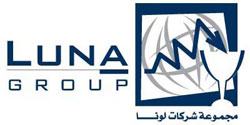
Founded in 1966, Luna Group , which is considered a leading group in Egypt , is a toll manufacturer and focuses on the production of decorative cosmetics , personal care products , and hotel amenities.
Luna Group handles the import, export, and distribution of the full range of raw materials / ingredients for:
- The pharmaceutical industry { API, Axillaries , intermediates}
- Cosmetics ,soap , detergents, oil & paint Industries
- Flavor and fragrances for all industries, food additives, pharmaceutical packing materials and machineries
Contact: Dr. George Amin Youssef (Chairman)
Tel.: +202 22 361 501 - Fax: +202 22 361 504
E-mail:This email address is being protected from spambots. You need JavaScript enabled to view it. – Website:www.lunagroupeg.com
News from Our Members
Would your company also like to share its business news with the ever growing ABLCC-readership, currently comprising over 1500 companies and officials based in Belgium, Luxembourg and the Arab world? Don’t hesitate to let us know! Send an e-mail to This email address is being protected from spambots. You need JavaScript enabled to view it.
Bekaert announces results of the public exchange offer on the bonds maturing on 16 April 2014
According to a press release by NV Bekaert SA, the latter company launched on 19 September 2013 an unconditional public exchange offer in Belgium and Luxembourg for all 150000 fixed rate bonds in an aggregate amount of EUR 150 000 000 maturing 16 April 2014 and having a gross coupon of 6.75% (ISIN Code BE0002167337). By this voluntary exchange transaction, NV Bekaert SA wished to extend the maturity of part of its total existing bond financing. The holders of the existing bonds had the opportunity to exchange their existing bonds for 7 -year bonds with a gross coupon of 4.75%to be issued on 17 October 2013 and maturing on 17 October 2020 (ISIN Code BE0002206721), in an exchange ratio of 1 to 1. At the end of the exchange period on 7 October 2013, 45 614 existing bonds were tendered into the exchange offer, representing an aggregate nominal amount of EUR 45 614 000.
The 45 614 new bonds, representing an aggregate nominal amount of EUR 45 614 000, were issued on 17 October 2013. The new bonds are listed on the regulated market of NYSE Euronext Brussels.
Read the entire press release on www.bekaert.com
Deloitte Luxembourg announces revenue growth of 19%
 With gross revenues of EUR 213.1 million, representing a year on year growth of 19%, Deloitte Luxembourg recorded strong financial results for the financial year ending 31 May 2013. These results were reflected across the firm’s three main functions - audit, tax and advisory & consulting - and come after two successive years of revenue growth. In 2011 and 2012, the firm posted a revenue increase of 8% and 10% respectively. Over recent years, Deloitte’s strategic objectives around clients, talent, quality and innovation have been instrumental in this achievement.
With gross revenues of EUR 213.1 million, representing a year on year growth of 19%, Deloitte Luxembourg recorded strong financial results for the financial year ending 31 May 2013. These results were reflected across the firm’s three main functions - audit, tax and advisory & consulting - and come after two successive years of revenue growth. In 2011 and 2012, the firm posted a revenue increase of 8% and 10% respectively. Over recent years, Deloitte’s strategic objectives around clients, talent, quality and innovation have been instrumental in this achievement.
“The strong growth of our revenues observed again in the last financial year reinforces our confidence in the business model we have consistently been deploying over the years. It bears testimony to the relentless focus we place on quality service delivery and closeness with the true preoccupations of our clients. Our capacity to accompany our clients as they navigate challenging times and to deliver a range of services uniquely tailored to their evolving needs, are distinctive strengths in the current market environment”, says Yves Francis, Managing Partner of Deloitte Luxembourg.
Read the full press release on www.deloitte.com
Etihad Airways continues to achieve record growth in the third quarter of 2013
 Etihad Airways continued to achieve record growth in the third quarter of 2013, with revenue from passenger services exceeding USD 1 billion for the first time and passenger numbers passing three million.
Etihad Airways continued to achieve record growth in the third quarter of 2013, with revenue from passenger services exceeding USD 1 billion for the first time and passenger numbers passing three million.
The President and Chief Executive Officer of Etihad Airways, James Hogan, said the Q3 growth occurred in a climate of increasing capacity and ongoing price competition. It also compensated for reduced travel during the Holy Month of Ramadan, which fell across the traditional peak travel months of July and August.
Read the full press release on www.etihad.com
Qatar Airways flies Dreamliner between Doha and Brussels
 Qatar Airways will start using a Boeing 787-8 'Dreamliner' starting the 1st of December for the daily connection between Doha and Brussels. It is the first time that an airline company will use the new Boeing airplane on a regular basis for flying to the Belgian airport. Until now, Qatar Airways flew its passengers from and to Doha and Brussels with an Airbus A330.
Qatar Airways will start using a Boeing 787-8 'Dreamliner' starting the 1st of December for the daily connection between Doha and Brussels. It is the first time that an airline company will use the new Boeing airplane on a regular basis for flying to the Belgian airport. Until now, Qatar Airways flew its passengers from and to Doha and Brussels with an Airbus A330.
The Qatar Airways stable is already home to eight Dreamliners. The airplane offers room to 22 business and 232 economy seats.
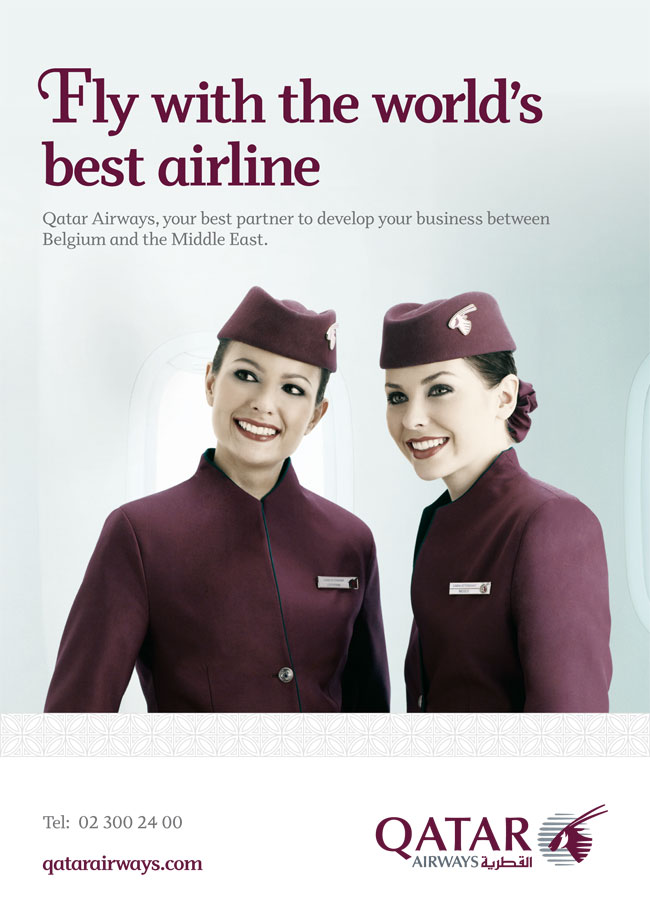
Economic News
Finance
Four banks in Arab world among Global Finance’s fifty safest banks
 The National Bank of Abu Dhabi, the National Bank of Kuwait, Qatar National Bank and the Saudi Samba Financial Group can count themselves amongst the fifty safest banks in the world, according to Global Finance Magazine. Global Finance annually composes a list of the fifty safest banks on the basis of an evaluation of long-term credit ratings—from Moody’s, Standard & Poor’s and Fitch—and total assets of the 500 largest banks worldwide.
The National Bank of Abu Dhabi, the National Bank of Kuwait, Qatar National Bank and the Saudi Samba Financial Group can count themselves amongst the fifty safest banks in the world, according to Global Finance Magazine. Global Finance annually composes a list of the fifty safest banks on the basis of an evaluation of long-term credit ratings—from Moody’s, Standard & Poor’s and Fitch—and total assets of the 500 largest banks worldwide.
Islamic financial services sector expected to double in size by 2015
 According to a report released at a senior level debate organised by Dubai International Academic City (DIAC) in collaboration with the organisers of the Global Islamic Economy Summit, funds worth about USD 124 billion could potentially enter the UAE Islamic banking system by 2015, creating approximately 7,800 new jobs at Islamic banks if the current asset concentration ratios remain similar. The report expects the Islamic financial services sector to double in size from approximately 10,000 employees currently to 20,000 by 2015.
According to a report released at a senior level debate organised by Dubai International Academic City (DIAC) in collaboration with the organisers of the Global Islamic Economy Summit, funds worth about USD 124 billion could potentially enter the UAE Islamic banking system by 2015, creating approximately 7,800 new jobs at Islamic banks if the current asset concentration ratios remain similar. The report expects the Islamic financial services sector to double in size from approximately 10,000 employees currently to 20,000 by 2015.
Additionally, 500 jobs will be created in other Islamic financial services segments, according to a recent analysis by Tahseen Consulting, a specialised advisor on strategic and organisational issues in the Arab world.
Healthcare
Japan stepping up measures to export Japanese medical facilities to the Middle East
 According to “The Japan News”, the Japanese government will be assisting Kuwait in establishing and managing a hospital that will provide such services as advanced regenerative medicine and cancer treatment as part of its effort to export Japanese medical facilities and expertise to the Middle East. The hospital will be attached to an educational institution that will train nurses and other medical professionals also with the cooperation of the Japanese government.
According to “The Japan News”, the Japanese government will be assisting Kuwait in establishing and managing a hospital that will provide such services as advanced regenerative medicine and cancer treatment as part of its effort to export Japanese medical facilities and expertise to the Middle East. The hospital will be attached to an educational institution that will train nurses and other medical professionals also with the cooperation of the Japanese government.
The initiative is a part of the government’s large-scale project to export Japanese hospitals, including medical equipment and know-how, as a package. As demand for medical services in the Middle East is expected to grow, the government also aims to make Kuwait a base for promoting Japanese-style medical services.
The two governments are currently in negotiations over the project, with the aim of finalizing an agreement early next year. The Kuwaiti government will provide the necessary financial resources and land, while the Japanese side will take charge of design, construction and management of the facilities.
The new hospital, to open as early as 2016, will be established in Kuwait City and have about 1,000 beds for inpatients.
Gulf
Saudi Arabia plans to raise production capacity in petrochemical sector
 Saudi Arabia plans to invest nearly SR 100 billion (USD 26.7 billion) to enhance the petrochemical industry and raise the production capacity from the current level of 60 million tons to 80 million tons, or an increase of 33 percent, by 2015.
Saudi Arabia plans to invest nearly SR 100 billion (USD 26.7 billion) to enhance the petrochemical industry and raise the production capacity from the current level of 60 million tons to 80 million tons, or an increase of 33 percent, by 2015.
The petrochemical sector has witnessed an 8.2 percent decline since the beginning of the current year in terms of revenues due to fears of investors over low global demand on petrochemical products, according to a report published by Zawya, an online financial news provider. According to the report, Saudi Arabia ranked first and second amongst the world’s top producing countries of methanol and ethylene, respectively, the two essential components in petrochemical industry. The Kingdom’s share to the GCC and global petrochemical products stands at 62 percent and 8 percent, respectively, the report said.
Saudi Economic Insight 2013 identifies the nonoil sector as driver of Saudi growth in 2013-2014
 Saudi Arabia’s nonoil sector will continue to grow strongly, reflecting government-led infrastructure and mining projects, according to the Saudi Arabia Economic Insight 2013 report recently published by the QNB Group. Focusing on macroeconomic indicators, the report points out that Saudi Arabia enjoyed the second best economic growth performance among G-20 states in 2012 (6.8 percent).
Saudi Arabia’s nonoil sector will continue to grow strongly, reflecting government-led infrastructure and mining projects, according to the Saudi Arabia Economic Insight 2013 report recently published by the QNB Group. Focusing on macroeconomic indicators, the report points out that Saudi Arabia enjoyed the second best economic growth performance among G-20 states in 2012 (6.8 percent).
According to the report, Saudi Arabia has the lowest risk spreads in the region and furthermore enjoys high investment grade long-term foreign currency credit ratings from Moody’s, Standard and Poor’s (S&P) and Fitch, at Aa3, AA- and AA- respectively. In May 2013, S&P upgraded Saudi Arabia’s outlook to positive, reflecting its strong economic growth prospects. QNB Group however forecasts a slight slowdown in real GDP growth to 4.0 percent in 2013 as oil output declines due to weakening global demand.
The nonoil sector is projected to continue its strong growth, reflecting government-led infrastructure and mining projects. Real GDP growth will pick up to 4.4 percent in 2014 with a slight recovery in the oil sector and continued strong non-oil activity. Inflation is expected to remain moderate over the medium term. The current account surplus is projected to narrow in 2013 and 2014, as lower oil prices and production and higher imports reduce the overall trade balance. The fiscal surplus will be lower in 2013 and 2014, reflecting lower oil revenue and higher government infrastructure spending. The outlook for the banking sector remains positive as loan growth is set to pick up with brighter profitability prospects as interest rates trend up.
A sector that is particularly gaining in significance is construction. According to “Arab News”, the Saudi construction market is the most valuable market in the GCC at present. It is valued at USD 495 billion, including projects currently under way and those confirmed and in pre-execution stage.
Qatar to step up (petro)chemicals and LPG production
 Qatar is set to step up its chemicals, petrochemicals and LPG output in the coming years, said HE the Minister for Energy and Industry, Dr Mohamed bin Saleh al-Sada, speaking at the 8th LPG Trade Summit on 18 November.
Qatar is set to step up its chemicals, petrochemicals and LPG output in the coming years, said HE the Minister for Energy and Industry, Dr Mohamed bin Saleh al-Sada, speaking at the 8th LPG Trade Summit on 18 November.
Some important contributing projects are Al-Karaana and Al-Sejeel, in addition to a Qafco expansion, which is the world’s largest single-site producer of both ammonia and urea.
Al-Sada said Qatar’s LPG production, which currently stands at 11mn tonnes per year, will go up by 0.5mn tpy next year with the 2014 commissioning of the Barzan Gas Project. More LPG volumes are expected from the Bul-Hanaine oil field development, which will not just enhance crude oil production, but will also add important quantities of ethane, propane, and butane.
“Recently, we have announced a new offshore field discovery in North Field’s Block 4 North, with as much as 2.5tn cubic feet of natural gas. This is Qatar’s first new discovery in 42 years, coming after four years of intensive exploration activities,” the minister said.
Tech Free Zones in electronics trade hub Dubai are ramping up investments to attract entrepreneurs
 Dubai’s two free zones for technology, Dubai Internet City (DIC) and Dubai Silicon Oasis (DSO), are about to expand their business incubators to make way for more start-ups.
Dubai’s two free zones for technology, Dubai Internet City (DIC) and Dubai Silicon Oasis (DSO), are about to expand their business incubators to make way for more start-ups.
DIC aims to provide start-ups with knowledge, expertise in best practices and help with funding in an effort to develop the information technology sector. There are currently 1,400 companies located in DIC. Last year 1,050 companies from around the world registered to open an office there. Prominent among the free zones’ efforts is a programme called “In5” which assists entrepreneurs every step along the way from idea creation through implementation to product launch.
Previously developers have voiced concerns over the high costs involved in setting up in the DIC, especially when compared with other technology centres in Jordan or Egypt. According to Majed Al Suwaidi, the managing director of DIC, “Dubai itself is generally more expensive. You have to compare apples to apples […] Companies registered with In5 have a very good starting platform, we are very competitive and give them subsidies and discounts and help with different areas like licensing fees and their location costs.” Currently there are 25 companies located within In5, but the DIC is hoping to expand that next year.
Meanwhile, Dubai is reinforcing its leading position as a major hub for global electronics trade. According to official statistics recently released by Dubai Customs, the emirate witnessed a significant jump of 30 per cent in electronics foreign trade during the first half of 2013.
Merger of Abu Dhabi and Dubai stock markets to give birth to one of the strongest markets in the Gulf
 The merger of Abu Dhabi and Dubai stock markets will create one of the strongest markets in the Gulf region, the Middle East and North Africa, a senior official said on Monday.
The merger of Abu Dhabi and Dubai stock markets will create one of the strongest markets in the Gulf region, the Middle East and North Africa, a senior official said on Monday.
Mohammed Al Hashemi, president of the UAE Financial Markets Association, said in comments published by news agency WAM that integration will attract more investors and create big opportunities to promote the UAE capital market.
He said this "would have significant benefits for both shareholders and participants in the market and thus the national economy". He told WAM in an interview that the merger will help the country to get ranked higher among regional and international securities markets, thus attracting a lot more potential investors, especially foreign ones and international portfolios.
Earlier this month, it was reported that Abu Dhabi and Dubai have hired banks to advise on a possible merger of their two main stock exchanges. Any merger of the exchanges would be one of the biggest reforms in the country's financial industry in recent years.
Talks on a tie-up between the Dubai Financial Market (DFM) and the Abu Dhabi Securities Exchange (ADX) have occurred on and off since at least 2010, but they have been hindered by differences over valuations and Dubai's 2009-2010 corporate debt crisis.
Oman steps up airport and road construction
 According to Omani top government officials, transportation projects (airport and roads) form the largest portion of Oman’s civil projects, with over USD 20 billion worth of contracts either in the pipeline or up for tender. The most strategic projects include the USD 300 million Ras al-Hadd airport package 3, which is up for tender, and the USD 2.6 billion Batinah Expressway project, a six-package deal that has already been awarded to contractors, except for Package 2. On 19 November, the Ministry of Transport and Communications signed thirteen agreements, including three major contracts to build Batinah Expressway, with contracting companies for a total worth of OMR 535.56 million.
According to Omani top government officials, transportation projects (airport and roads) form the largest portion of Oman’s civil projects, with over USD 20 billion worth of contracts either in the pipeline or up for tender. The most strategic projects include the USD 300 million Ras al-Hadd airport package 3, which is up for tender, and the USD 2.6 billion Batinah Expressway project, a six-package deal that has already been awarded to contractors, except for Package 2. On 19 November, the Ministry of Transport and Communications signed thirteen agreements, including three major contracts to build Batinah Expressway, with contracting companies for a total worth of OMR 535.56 million.
Other important projects are the Salalah Port expansion, including the USD 143 million general cargo and liquid bulk terminal and the USD 13 billion worth of heavy manufacturing and industrial projects. The latter include Takamul’s metal projects, Haya Water’s TSE and wastewater projects opportunities valued at USD 545 million, and Oman Oil Company’s Ras Markaz crude storage terminal.
Moreover, the Oman Oil Marketing Company (omanoil) recently announced it has signed a bunkering licence and land lease agreement with Port of Duqm Company (PDC) to develop a bunkering terminal and ancillary facilities at the Port of Duqm. This terminal will provide heavy fuel oil and marine diesel oil, as well as marine lubricants to ships calling at the port and surrounding waters.
Levant
Beirut Port bustling with activity due to regional situation and heavy investments

A USD 140 million investment has turned Beirut Port into one of the largest container handlers in the East Mediterranean amid growing demand for transshipment goods from war-torn Syria, a leading maritime official said during the official inauguration on 22 October of the expansion of Beirut Port in the presence of President Michel Sleiman.
Contrary to the trend followed by most economic sectors in Lebanon, Beirut Port recorded impressive growth over the past two years both in revenues and in the number of containers it handled.One of the reasons behind this phenomenal growth is the Syrian crisis.“No doubt that Beirut Port prospered after the war broke out in Syria. The international sanctions on Syria caused activity at the Syrian ports to fall by more than 70 percent. Lebanese merchants are now supplying all the badly needed goods to their Syrian counterparts who visit Beirut Port to ship the containers in trucks to their country,” Eli Zakhour, head of the Beirut International Chamber of Navigation, explained. The port has also become one the busiest in the Middle East due to the high demand for transshipment containers from Syria and Iraq.
The wharf has been expanded from 600 meters long to 1100 meters, while the basin has become 16.5 meters deep, allowing Beirut Port to receive the largest container ships in the world. The port authorities also doubledthe number of cranes.
Beirut Port revenues registered a growth of 18.9 percent in the first nine months of this year compared to a growth of 11.9 percent in the same period of last year. The number of containers handled by Beirut Port in the month of September alone stood at 40,000 containers compared to 30,000 in the same month of last year.
Expansion of container and phosphate terminals testify to Aqaba economic renaissance
 On the 24th of October, Jordan’s King Abdullah inaugurated the expansion of the Aqaba Container Terminal and the new phosphate terminal, which has been set up at a cost of USD 240 million with a storage capacity of 240,000 tonnes. Built on a Build, Operate and Transfer basis, the terminal’s handling capacity is expected to reach six million tonnes annually. It features a 200-metre berth and can accommodate ships of various sizes, from 5,000 to 100,000-tonne shipments. The expanded container terminal has seen the berth extended to 1,000 metres from 540 metres and the anchorage upgraded to accommodate three huge ships at the same time. Further expansion is planned in three to five years to raise the handling capacity to 2.2 million containers.
On the 24th of October, Jordan’s King Abdullah inaugurated the expansion of the Aqaba Container Terminal and the new phosphate terminal, which has been set up at a cost of USD 240 million with a storage capacity of 240,000 tonnes. Built on a Build, Operate and Transfer basis, the terminal’s handling capacity is expected to reach six million tonnes annually. It features a 200-metre berth and can accommodate ships of various sizes, from 5,000 to 100,000-tonne shipments. The expanded container terminal has seen the berth extended to 1,000 metres from 540 metres and the anchorage upgraded to accommodate three huge ships at the same time. Further expansion is planned in three to five years to raise the handling capacity to 2.2 million containers.
Launched in 2004 “with the objective of unlocking the potential of the Aqaba Special Economic Zone (ASEZ) by accelerating its economic growth and development”, Aqaba Development Corporation (ADC) owns Aqaba’s seaport, airport and strategic parcels of land as well as the development and management rights for these assets. It is mandated to develop ASEZ by building new or expanding existing infrastructure through projects between the public and private sectors, under which the state retains land and infrastructure ownership while the private sector undertakes the responsibilities for financing, construction, and development and operational activities.
Projects implemented in line with this approach over the past years include the expansion to the Queen Alia International Airport, the Disi Water Conveyance Project, the new terminals in Aqaba and electricity-generation projects.
Russian Rosatom to build Jordan’s first two nuclear reactors
Jordan announced on Monday that it has selected Russia to build the country’s first two nuclear reactors in a bid to produce atomic energy within the next decade.At a press conference, the government announced that it has selected Russian state-owned firm Rosatom as its preferred vendor to construct two 1,000-megawatt (MW) nuclear power plants east of Amman by 2022.
As part of the decision, ratified by the Prime Ministry on Sunday, the government and the Russian firm have entered negotiations over electricity pricing in order to reach a final agreement and break ground on the reactors by 2015.
Officials say the deal aims to help achieve energy independence in Jordan, which imports around 97 per cent of its energy needs at a cost of over one-fifth of the gross domestic product, and bring stability to a sector that has been impacted by ongoing disruptions in Egyptian gas supplies and fluctuations in international oil prices.
Jordan has become the third Arab state to pursue peaceful nuclear energy, with the UAE set to build four reactors with a combined 5,600MW capacity by 2020 and Egypt reaffirming earlier this month its plans to establish a 1,000MW reactor by the end of the decade.
Palestinian Delegation in Belgium upgraded to “Diplomatic Mission”
The agenda of Belgian Vice-Prime Minister and Minister of Foreign Affairs, Didier Reynders, during a recent visit to Palestine and Israel was well-filled. Besides meeting with several Israel and Palestinian officials, including Mr. Mahmoud Abbas, the President of the Palestinian Authority, Mr. Reynders inaugurated the prenatal and pediatric section in the Holy Family maternity in Betlehem. At this occasion, the minister announced that the Belgian government will contribute EUR 30 000 to a project of the Order of Malta supporting maternity care services. He also committed himself to promoting the installation of Cat Lab devices, which allow for high quality cardiac screenings, in Ramallah, after Belgium had already done this in Gaza.
During his visit, Mr. Reynders also promoted a project which foresees the organization in 2014 of an economic conference in Brussels with the participation of international and Palestinian actors.
Last but not least, it was announced that the status of the Palestinian Delegation in Belgium will be upgraded to that of a diplomatic mission, which will mean that Head of Mission Mrs. Leila Shahid will carry the title of Ambassador.

North Africa and Maghreb
South Korea to build vocational and training centre in Benghazi
A new vocational and educational training centre is to be built in Benghazi by the Human Resources Development Service of Korea (HRD Korea), in a project funded by the Libyan government.
The USD 13.6 million deal will see HRD Korea build an institute that is an exact replica of a centre in South Korea with the capacity to accommodate 900 students. HDR Korea will be responsible for managing the construction of the premises as well as initially running the centre.
HRD Korea has also signed a USD 94.8 million contract with the Libyan Ministry of Labour and the Warrior Affairs Commission (WAC) to send Libyans to South Korea to study on vocation training programmes.
A contract for this ‘vocational education and training export project’ between HRD Korea and the Ministry of Labour was signed on the 21st of October. The scheme will see 1,400 Libyans, chosen by the Ministry of Labour, undertaking six-month vocational training courses in South Korea. Fields of study include electronics, mechanics, welding and plumbing.
Major players in the oil industry on exploration spree in Morocco
According to a press release by BP, the latter company reached an agreement to farm-in to three deepwater exploration blocks offshore Morocco in October. Agreements with Kosmos Energy cover three blocks in the Agadir Basin, offshore Morocco. Under the terms of the agreements, which are subject to government approval, BP will acquire a non-operating interest in each of the Essaouira Offshore, Foum Assaka Offshore and Tarhazoute Offshore blocks. BP expects its first well in Morocco to be drilled next year.
BP is the latest major player in the oil industry to participate in the exploration spree that is currently bringing energy companies to the Kingdom. At the beginning of the year, Chevron Corporation announced that its subsidiary, Chevron Morocco Exploration Ltd, signed petroleum agreements with Morocco's Office National Des Hydrocarbures Et Des Mines for three offshore areas.
Cairn Energy also recently announced it has entered into a farm-in agreement with Kosmos Energy and the Moroccan National Oil Company (ONHYM) for a 20% non-operated interest in an exploration block offshore North West Africa which is scheduled for drilling in H2 2014.
The farm-in to the Cap Boujdour exploration permit enables Cairn to access frontier acreage with transformational potential and containing a range of exploration play types. In the event of success, the area has significant follow-up potential, according to a Cairn Energy press release.
Moroccan Agency for Solar Energy and EIB negotiate next phase of Ouarzazate solar complex
 The European Investment Bank recently announced the construction and operation of a 200 MW CSP Parabolic trough plant under the next phase of the Ouarzazate solar power complex. Promoted by the Moroccan Agency for Solar Energy (MASEN), the project's main objective is to help developing a globally-available, non-carbon power generation technology that ultimately may not require fossil fuel back-up capacity and reduce the costs of CSP for world benefit. By creating a new green industry and increasing the penetration of renewable energy in the country's energy mix, the project will contribute to Morocco's objectives of a more secure energy supply, energy diversification, CO2 emission reductions, increased employment and protecting the local environment.
The European Investment Bank recently announced the construction and operation of a 200 MW CSP Parabolic trough plant under the next phase of the Ouarzazate solar power complex. Promoted by the Moroccan Agency for Solar Energy (MASEN), the project's main objective is to help developing a globally-available, non-carbon power generation technology that ultimately may not require fossil fuel back-up capacity and reduce the costs of CSP for world benefit. By creating a new green industry and increasing the penetration of renewable energy in the country's energy mix, the project will contribute to Morocco's objectives of a more secure energy supply, energy diversification, CO2 emission reductions, increased employment and protecting the local environment.
Chamber of Commerce of Mauritania enters new era
Recently, H.E. Mr. Mohamedou Ould Mohamed Mahmoud, Chairman of the Chamber of Commerce, Industry and Agriculture in Mauritania (CCIAM), announced the realization of a number of projects that take the CCIAM into a new era. Among them are the construction of a new business center with several meeting rooms and state of the art infrastructure and the creation of the International Centre for Mediation and Arbitration of Mauritania (CIMAM ) for settling disputes. Mr. Mahmoud also welcomes investors and researchers in need of reliable data on commercial and economic matters to benefit from the services offered by the Mauritanian Information Centre for Economic and Technical Development (CIMDET), an important CCIAM branch. Furthermore, a new new website, available in French, English, Spanish and Arabic, has recently been launched.
Mr. Mahmoud states that “these projects have seen the light of day at a time in which Mauritania, which benefits from a strategic geographic location, is striving to facilitate access to its natural resources and to optimize their exploitation.”

More information: www.chambredecommerce.mr
أخبار اقتصادية من بلجيكا واللوكسمبورج والاتحاد الأوروبي
عالم بلجيكي ينال جائزة نوبل للفيزياء
 مُنحت جائزة نوبل للفيزياء لعام 2013 للعالم البلجيكي فرانسوا انغلير وللعالم البريطاني بيتر هيغز. وقد طرح العالمان عام 1963 وبشكل منفصل نظرية بوجود جسيم أطلق عليه اسم بوزون هينغز. وقد أثبت الباحثون في المنظمة الأوروبية للأبحاث النووية مؤخرا وجود الجسيم خلال تجاربهم في مصادم الهدرونات الكبير.
مُنحت جائزة نوبل للفيزياء لعام 2013 للعالم البلجيكي فرانسوا انغلير وللعالم البريطاني بيتر هيغز. وقد طرح العالمان عام 1963 وبشكل منفصل نظرية بوجود جسيم أطلق عليه اسم بوزون هينغز. وقد أثبت الباحثون في المنظمة الأوروبية للأبحاث النووية مؤخرا وجود الجسيم خلال تجاربهم في مصادم الهدرونات الكبير.
وترى أكاديمية نوبل أن "هذه النظرية هي جزء محوري في النموذج القياسي في فيزياء الجسيمات التي تصف الطريقة التي تشكل فيها الكون".
والعالم انغلير الذي يرتبط اسمه بجامعة بروكسل الحرة هو أحد أبرز العلماء الناشطين في الأبحاث العلمية في بلجيكا، وقد انضم إلى العديد من العلماء البلجيكيين الحائزين على جائزة نوبل من قبل مثل كريستيان دو دوڤ، وألبرت كلود اللذين حازا على جائزة نوبل في الطب عام 1974، وإليا بريغوجين الذي حاز على جائزة نوبل للكيمياء عام 1977.
"هل تبدأ بمشروع؟ إذا باشر بالعمل" المقاول البلجيكي غانتر بولي يقدم الاقتصاد الأزرق


الاقتصاد الأزرق
دعت غرفة تجارة بروكسل السيد غانتر بولي المقاول والمبتكر المشهور لنموذج "الاقتصاد الأزرق" إلى تظاهرتها السنوية كضيف استثنائي.

وقد هاجم مبتكر "الاقتصاد الأزرق" "نموذج هارڤرد" أمام 452 مستمع من المقاولين وأصحاب المشاريع الذين اجتمعوا في مقر مدرسة سولڤاي العريقة للأعمال في بروكسل، وأوضح كيف يمكن الاستيحاء من الطبيعة للتوصل إلى حلول مثمرة حقا.
ونموذج الاقتصاد الأزرق الذي يقترحه غانتر بولي هو نموذج أخلاقي للتنمية المستديمة. ولكنه - على خلاف "الاقتصاد الأخضر" الذي يريد بولي أن يتجاوزه - نموذج أعمال ينتج قيمة مضافة، ويوفر فرص عمل، ويرتكز على الأنظمة البيئية التي تستخدم الموارد المتاحة وتستهلك طاقة قليلة بلا أي تبذير، وتعيد استخدام كافة المواد من دون رمي أية نفايات، وهو مربح جدا حسب ما شدد عليه غانتر بولي.
هل هذا مستحيل أو طوباوي؟ أصر غانتر على إقناع الحاضرين بتقديم أمثلة وافرة لديه تعتمد إلى حد كبير على إعطاء قيمة للنفايات، مثل صنع الورق من نفايات الورش المسحوقة، وإنتاج الفطر من ثفل القهوة، وصنع الخبز من نفايات مصانع الجعة، وإنتاج ألواح الأشعة فوق البنفسجية العالية الكفاءة من البلاسيتك المعاد استعماله.
ويشرح غانتر بولي الأفكار التي يعتمد عليها الاقتصاد الأزرق في مجموعة قصصية مخصصة للأطفال أطلق عليها اسم "قصص غانتر" وهي متوفرة باللغة العربية.
لمزيد من المعلومات:
غرفة تجارة بروكسل:www.beci.be
غانتر بولي: www.gunterpauli.com
منح المفوضية الفلسطينية العامة في بلجيكا صفة بعثة دبلوماسية
أنهى السيد ديدييه رينديرز، نائب رئيس الوزراء ووزير الخارجية البلجيكي، بتاريخ 12 تشرين الثاني / نوڤمبر زيارة دامت 3 أيام للأراضي الفلسطينية، قابل خلالها مسؤولين فلسطينيين من بينهم الرئيس الفلسطيني السيد محمود عباس. وكان أهم تصريح خلال زيارة السيد رينديرز للسلطة الفلسطينية هو منح المفوضية الفلسطينية العامة في بلجيكا صفة بعثة دبلوماسية، وهذا يعني أن السيدة ليلى شهيد رئيسة البعثة باتت تحمل لقب سفير.
وقابل السيد رينديرز العديد من الشركاء الاقتصاديين للبحث معهم حول تنظيم مؤتمر اقتصادي عالمي في بروكسل يجمع بين مؤسسات دولية حول فلسطين.
كما منح الوزير30000 يورو مخصصة لقسم الولادة في مستشفى العائلة المقدسة في بيت لحم في إطار مشروع لمنظمة فرسان مالطا، وقد افتتح الوزير برفقة رئيس الحكومة الفلسطينية قسم ما قبل الولادة وقسم الأطفال في المستشفى. وقد وعدت بلجيكا على المساعدة في افتتاح مخبر كات لاب في رام الله، كما فعلت في غزة سابقا، وهو يحتوي على أجهزة طبية متقدمة تسمح بالتحر عن الأمراض القلبية.

The Ins and Outs of Belgium
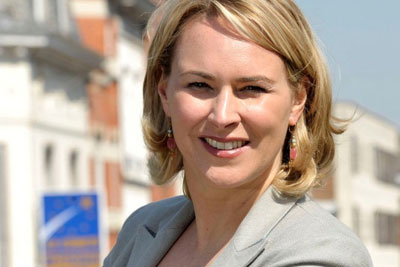
An interview with Mrs. Céline Fremault, Minister of the Government of the Brussels-Capital Region, responsible for Economy, Employment, Scientific Research and Foreign Trade
After Minister Marcourt presented the Walloon region to the ABLCC readership in the last edition of the Chamber’s newsletter, it is now the turn for Mrs. Céline Fremault, Minister of the Government of the Brussels-Capital Region responsible for Economy, Employment, Scientific Research and Foreign Trade, to discuss ‘her’ region and reflect on its trade and investment relations with the Arab world. And it must be said, she does so in a spirit of enthusiasm that aptly demonstrates her appetite for further enhancing the Arab-Brussels partnership. Discover a minister ready to give a firm boost to commercial relations with a region on the other side of the Mediterranean brimming with opportunity and called the Arab world.

Dear Minister Fremault, let’s start by refreshing the memories of our readers. In Belgium, regional governments have important competences in the field of economy. On the practical level, what does this mean for foreign business people looking to develop trade and investment relationships with Belgian partners?
A little bit of theory
The Flemish Region, the Brussels-Capital Region and the Walloon Region have powers relating to the economy, employment, agriculture, water policy, housing, public works, energy, transport (except Belgian Railways), the environment, town and country planning, nature conservation, credit, foreign trade, supervision of the provinces, communes and inter-communal utility companies. They also have powers relating to scientific research and international relations in those fields.
Céline Fremault: “Benefitting from an important degree of autonomy in the field of economy, Belgian regions are able to develop a policy that is genuinely tailored to the needs and specificities of each. It also allows foreign companies and investors to acquire a deeper understanding of the economic fabric that makes up each particular region. But I would like to underscore that this does not in any manner prevent the regions to collaborate in economic matters, which is of course of crucial importance when foreign trade is concerned. Consider our economic representatives who work in the Belgian embassies, for example: they are employed not by the Belgian federal state but by the regions, but more often than not one economic attaché covers several regions, depending on where they are located. Furthermore, the regions also regularly pool forces for the organization of all sorts of activities related to foreign trade.”
What are the most important pillars of the economy of the Brussels Capital Region (BCR)? And how does the latter distinguish itself from other economies in the region?
Céline Fremault: “The Brussels region finds itself in a very particular economic situation. Until the beginning of the 1960’s, Brussels genuinely was an industrial city. Today, we encounter an entirely different Brussels, one in which services account for eighty-five per cent of the economy, and ninety-five per cent of the economic fabric is made up by extremely small, small and medium sized companies. These changes are of course due to the important strategic position Brussels occupies on the European and international levels.”
And is it an attractive destination for Arab investors?
I see a continuously growing role for a large number of Brussels business men and women originating from the Arab world who are keen on preserving relations with their countries of origin. Their thorough knowledge of the languages and cultures of both sides allows them to act as facilitators and cultural mediators, which is why I think their presence in Brussels is an enormous advantage for developing and sustaining solid relationships with the Arab world.
Céline Fremault: “I would even say it is an excellent destination for Arab investors. First of all, it is the capital of the European Union, and in that capacity it is an extremely important decision centre on a European as well as on an international level. Also in its role as a centre for international business, Brussels definitely is a city to be reckoned with. Each time I visit foreign countries in my capacity of Brussels Minister of Foreign Trade and Economy, I am pleasantly surprised by the importance attached to Brussels as a centre of international affairs by foreign business people, who are deeply aware of the fact that a lot of important decisions are made here.
Moreover, seeing that its location allows it to reach 500 million consumers, Brussels can truly call itself “The Gateway to Europe”. It is a well known fact among foreign investors that Brussels offers the ultimate testing ground for new products and services, as it is sitting on the crossroads of the Latin and German cultures. And then I should also mention the fact that a number of measures have been developed to the benefit of investors, including, for example, beneficial tax rates.
But allow me to come back to another important advantage offered by the Brussels Region on the cultural level – which after all is an extremely important dimension when we’re talking foreign trade relations. Brussels benefits from the enormous advantage of having a pool of multilingual employees at its disposal who are used to working in an international environment. And with regard to trade and investment relations with Arab countries in particular, I see a continuously growing role for a large number of Brussels business men and women originating from the Arab world who are keen on preserving relations with their countries of origin. Their thorough knowledge of the languages and cultures of both sides allows them to act as facilitators and cultural mediators, which is why I think their presence in Brussels is an enormous advantage for developing and sustaining solid relationships with the Arab world.”
You identified making Brussels “a city of innovation” as an important goal for you to achieve during your mandate as a minister. This might be of huge interest to the Arab world, as transforming Arab economies are currently welcoming innovative technologies in a wide array of sectors. What are the strengths of the BCR in this field?
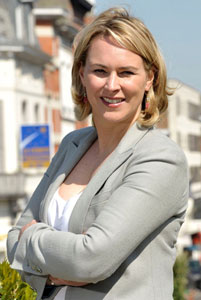 Céline Fremault: “Brussels is currently heavily investing in the development of smart specialisation that builds on its existing strengths in ICT, life sciences and the environment. We are according a lot of attention to the development of such research related to intelligent economy and niche sectors, which we feel could offer us an enormous advantage in the future.
Céline Fremault: “Brussels is currently heavily investing in the development of smart specialisation that builds on its existing strengths in ICT, life sciences and the environment. We are according a lot of attention to the development of such research related to intelligent economy and niche sectors, which we feel could offer us an enormous advantage in the future.
And let’s not forget that, as the city which welcomes most university students in Belgium, Brussels harbors a number of high quality universities.” (This is a fact certainly attested to by Professor Englert of the Université Libre de Bruxelles recently winning the Nobel Prize for Physics, together with British physicist Peter Higgs, ed.)
In a recent interview published in “Entreprendre”, the monthly magazine of the Brussels Chamber of Commerce, you identified boosting the networks of the BCR in foreign countries as one of the top priorities for the near future. Is anything on the agenda with regard to the Arab world in particular?
Céline Fremault: “We are very well represented in the Arab world, be it directly or indirectly, through our colleagues from the Flemish or Walloon regions. We are present in Algeria, Kuwait, Lebanon and the Palestinian Territories, and are also represented in Egypt, Iraq, Libya, Morocco, Tunisia, Saudi Arabia and the United Arab Emirates. The number of actions we undertake with regard to the Arab world is also continuously increasing: in March 2014 there will be the Princely Mission to Saudi Arabia and Oman organized by the Belgian Foreign Trade Agency, and in the near future Brussels Invest & Export (the Foreign Trade and Foreign Investments Service of the Brussels Regional Capital, ed.) will be participating in numerous conferences in the Arab world: GITEX Technology Week and Arab Health in Dubai are two events that come to mind. We also receive a lot of invitations to tender and invitations from buyers from Lebanon, Jordan, Algeria and the Palestinian Territories, amongst others, and our expertise in the public transport sector, to give one example, is in very high demand in the Arab world. Furthermore, there are a number of countries, as Algeria and Morocco, who are extremely important economic partners with whom we are in constant contact.”
You recently headed an economic mission of the BCR to Morocco. What are the most promising areas for collaboration?
Céline Fremault: “The economic mission to Morocco we organized in September was a huge success, with forty companies and over fifty persons accompanying us there. Here also, we were delighted to discover that two thirds of participants were Brussels business people of Moroccan origin who want to do business with their country of origin. As I mentioned earlier, we support them to the fullest extent possible in their undertakings, as they are able to play a role that greatly benefits the development of relations between Brussels and the Arab countries.
The Brussels business community in general is already very well represented in the Moroccan market. Transurb Technirail, for example, has played an important role in the development of the tram network in Casablanca, and BESIX is involved in the construction of the Tanger Med II Harbor. The majority of participants to the mission have an expertise in services, new technologies or consultancy, and it was very interesting to learn from and exchange expertise with the Moroccan business people we met. In the end, several participants to the mission even ended up staying in Morocco a little while longer, because they were able to get appointments they never expected to be able to arrange so soon. We also had very good contacts with the Moroccan Ministers of Transport and Employment.”
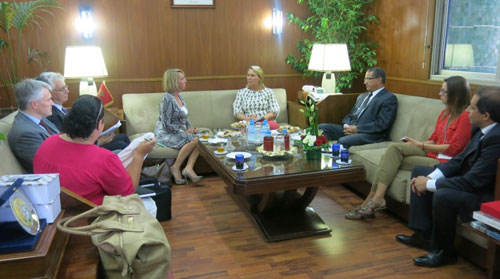
As you already briefly mentioned, a next important mission to the Arab world in which the BCR will participate is going to Saudi Arabia and Oman in March 2014. What sectors and topics do you intend to accord particular attention to during this princely mission?
Morocco has a very similar view on the importance of female entrepreneurship, and it was very valuable for both sides to exchange experiences on the matter. For me, it was touching to see so many Brussels and Moroccan business women in one room talking business, and I intend to continue collaborating with our Moroccan partners on this topic.
Céline Fremault: “A wide range of sectors are occupying an important position in our relations with Saudi Arabia and Oman. There are the sectors of civil engineering, infrastructure, consultancy, legal services, health care, the luxury goods sector, … Business services in particular will retain a great deal of our attention. We are currently working very hard on the preparation of the mission, and we are delighted to notice that there is a lot of interest from Brussels companies to participate. Indeed, I feel the mission will be crucial for the future development of trade and investment relations between the Belgian regions and Oman and Saudi Arabia.”
You are the first Minister of the BCR to accord particular attention to the role of female entrepreneurs in Brussels. Why is it important to provide women entrepreneurs in the BCR with specific support structures? Is this a topic that you also tend to raise in your contacts with foreign countries, and do you see possibilities for collaboration with the Arab world in this regard?
Céline Fremault: “I noticed that a lot of initiatives and measures had been put into place to support Brussels entrepreneurs in general, but none of these approached the question from a gender point of view. Yet today, there is a huge lack of female entrepreneurs in the Brussels Region, and this is a field in which we have a lot of catching up to do. We have several projects running at the moment to encourage women to start doing business and to assist them in their undertakings.
I had the opportunity to focus on this particular topic during our mission to Morocco, where they have a very similar view on the importance of female entrepreneurship. Very active in this field, Morocco has been able to take a number of positive steps with regard to the role of business women, and it was very valuable for both sides to exchange experiences on the matter. For me, it was touching to see so many Brussels and Moroccan business women in one room talking business, and I intend to continue our collaboration with our Moroccan partners on this topic.
I definitely see possibilities for collaboration with other Arab countries in this regard as well, and I will work hard to make sure that business women who until now have been unfamiliar with the Arab world, will join us during our economic missions to discover the opportunities that loom large on the Arab horizon.“
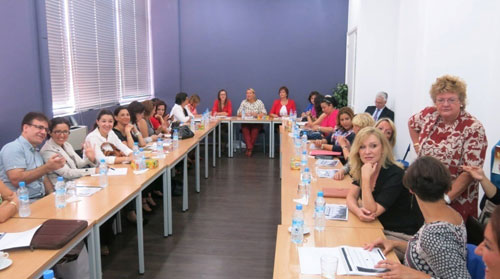
To conclude, how do you see the future of the trade and investment relationship between the BCR and the Arab world?
Céline Fremault: “It is clear to me that Arab world is a crucial partner for the Brussels Region, as well as for Belgium and the European Union as a whole. Trade statistics show that overall Belgian exports to the Arab world increased by more than 11% in 2012, a positive trend that is continuing into 2013. Imports from the Arab world, on the other hand, have been slightly decreasing during the first six months of 2013 (the decline of Arab imports in Belgium during this period is situated around 8%, ed.), but I am convinced this is a temporary phenomenon, related to the political crises certain Arab countries are currently witnessing. Moreover, I feel that we shouldn’t focus too much on import-export figures, but accord all the more attention to the development of a two-street relationship based on shared interests, trust, and quality products and services that benefit both sides. And it is obvious that beautiful opportunities for collaboration exist in sectors of engineering, architecture, transports and health care, to name just a few.
At Brussels Invest & Export, we will continue our efforts to further develop our relationship with this region. As a matter of fact, I feel that actors as Chambers of Commerce also have an important role to play in this regard: as facilitator of contacts between business people, to assure a good follow up to economic missions together with the regions, and to forge relationships that are solid and long-lasting.”
With these encouraging words in mind, we let a Minister with a great vision for a region that maybe small in size, but is all the larger in reach and potential, get back to work.
Want to know more?
www.brussels.irisnet.be/en/
www.invest-export.irisnet.be/en/
www.innoviris.be
بلجيكا تحت الأضواء:
في هذا الحيز يعرف وزراء الاقتصاد والتجارة الخارجية البلجيكيون المواطن العربي بأقاليمهم ويقدمون تقييما للعلاقات التجارية والتدفقات الاستثمارية بين العالم العربي وبلجيكا.
بلجيكا تحت الأضواء: هذا الشهر السيدة سيلين فريمون، وزيرة في حكومة منطقة بروكسل العاصمة، ومسؤولة عن الاقتصاد والعمل والبحث العلمي والتجارة الخارجية.
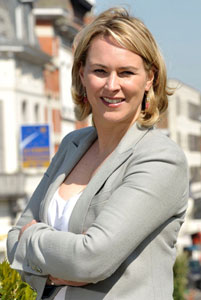 بعد أن قدم السيد الوزير جان-كلود ماركور، المنطقة الوالونية إلى قراء الغرفة التجارية العربية البلجيكية اللوكسمبورجية في الإصدار الأخير من نشرتها الالكترونية، تأتي السيدة سيلين فريمون، الوزيرة في حكومة منطقة بروكسل العاصمة، والمسؤولة عن الاقتصاد والعمل والبحث العلمي والتجارة الخارجية، لتتحدث عن منطقتها وتعطي انطباعاتها حول العلاقات التجارية والاستثمارية بينها وبين العالم العربي. وهي تقوم بذلك بحماس يوضح رغبتها في تعزيز الشراكة بين العرب وبروكسل. فلنكتشف معا وزيرة مستعدة لإعطاء دفعة قوية للعلاقات التجارية التي تربط منطقتها مع الجانب الآخر من البحر الأبيض المتوسط الغني بالفرص أي العالم العربي.
بعد أن قدم السيد الوزير جان-كلود ماركور، المنطقة الوالونية إلى قراء الغرفة التجارية العربية البلجيكية اللوكسمبورجية في الإصدار الأخير من نشرتها الالكترونية، تأتي السيدة سيلين فريمون، الوزيرة في حكومة منطقة بروكسل العاصمة، والمسؤولة عن الاقتصاد والعمل والبحث العلمي والتجارة الخارجية، لتتحدث عن منطقتها وتعطي انطباعاتها حول العلاقات التجارية والاستثمارية بينها وبين العالم العربي. وهي تقوم بذلك بحماس يوضح رغبتها في تعزيز الشراكة بين العرب وبروكسل. فلنكتشف معا وزيرة مستعدة لإعطاء دفعة قوية للعلاقات التجارية التي تربط منطقتها مع الجانب الآخر من البحر الأبيض المتوسط الغني بالفرص أي العالم العربي.
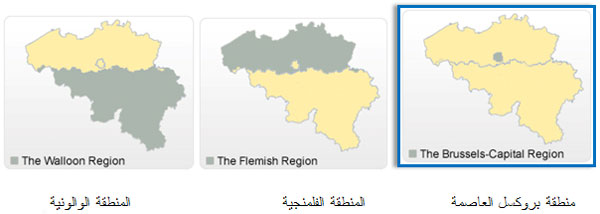
معالي الوزيرة دعينا نبدأ بتذكير قرائنا في بلجيكا بأن مجال الاقتصاد يدخل ضمن اختصاصات حكومات المناطق في بلجيكا. ماذا يعني هذا على المستوى العملي بالنسبة لرجال الأعمال الأجانب الذين يتطلعون إلى تطوير العلاقات التجارية والاستثمارية مع شركاء بلجيكيين؟
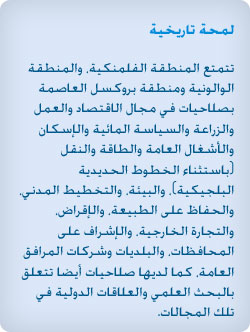 الوزيرة فريمون: المناطق البلجيكية تتمتع بدرجة كبيرة من الاستقلال في مجال الاقتصاد وهي قادرة على وضع سياسة تم تفصيلها تبعا لاحتياجات وخصوصيات كل منها. وهي تسمح للشركات وللمستثمرين الأجانب بتفهم أعمق للبنية الاقتصادية لكل منطقة بحد ذاتها. ولكن أود أن أؤكد أن هذا لا يمنع المناطق بأي شكل من الأشكال من التعاون في المسائل الاقتصادية التي هي بطبيعة الحال ذات أهمية حاسمة عندما يتعلق الأمر بالتجارة الخارجية. فلو نظرنا على سبيل المثال إلى الممثليات الاقتصادية في السفارات البلجيكية سنجد أن العاملين فيها مكلفين من حكومات المناطق وليس من قبل الدولة الفيدرالية البلجيكية، ولكن في كثير من الأحيان يمثل الملحق الاقتصادي عدة مناطق حسب المكان الذي يتواجد فيه. وعلاوة على ذلك، توحد المناطق أيضا قواها بانتظام في تنظيم مختلف أنواع الأنشطة المتعلقة بالتجارة الخارجية.
الوزيرة فريمون: المناطق البلجيكية تتمتع بدرجة كبيرة من الاستقلال في مجال الاقتصاد وهي قادرة على وضع سياسة تم تفصيلها تبعا لاحتياجات وخصوصيات كل منها. وهي تسمح للشركات وللمستثمرين الأجانب بتفهم أعمق للبنية الاقتصادية لكل منطقة بحد ذاتها. ولكن أود أن أؤكد أن هذا لا يمنع المناطق بأي شكل من الأشكال من التعاون في المسائل الاقتصادية التي هي بطبيعة الحال ذات أهمية حاسمة عندما يتعلق الأمر بالتجارة الخارجية. فلو نظرنا على سبيل المثال إلى الممثليات الاقتصادية في السفارات البلجيكية سنجد أن العاملين فيها مكلفين من حكومات المناطق وليس من قبل الدولة الفيدرالية البلجيكية، ولكن في كثير من الأحيان يمثل الملحق الاقتصادي عدة مناطق حسب المكان الذي يتواجد فيه. وعلاوة على ذلك، توحد المناطق أيضا قواها بانتظام في تنظيم مختلف أنواع الأنشطة المتعلقة بالتجارة الخارجية.
ما هي أهم ركائز اقتصاد منطقة بروكسل العاصمة؟ وكيف يمكن التمييز بينه وبين الاقتصادات الأخرى؟
الوزيرة فريمون: إن منطقة بروكسل تجد نفسها في وضع اقتصادي خاص جدا. فحتى بداية عقد الستينات 1960، كانت حقا مدينة صناعية. أما اليوم، نحن نواجه بروكسل مختلفة تماما، حيث تمثل الخدمات خمسة وثمانين في المائة من النشاطات الاقتصادية، وخمسة وتسعين في المائة من البنية الاقتصادية يتكون من شركات صغيرة للغاية، وشركات صغيرة ومتوسطة الحجم. وتعود هذه التغييرات بالطبع إلى الموقع الاستراتيجي الهام الذي تحتله بروكسل على الصعيدين الأوروبي والدولي.
وهل هي وجهة جذابة للمستثمرين العرب؟
الوزيرة فريمون: أود أن أقول أنها حقا وجهة ممتازة للمستثمرين العرب. فأولا، هي عاصمة الاتحاد الأوروبي وبهذه الصفة إنها مركز قرار مهم للغاية على المستوى الأوروبي وكذلك على المستوى الدولي. كما أنها بالتأكيد مدينة لا يستهان بها نظرا لدورها كمركز أعمال تجارية دولية، ففي كل مرة أزور بلد أجنبي بصفتي وزيرة التجارة الخارجية والاقتصاد لمنطقة بروكسل، تنتظرني مفاجأة سارة بفضل الأهمية التي يوليها رجال الأعمال الأجانب لبروكسل كمركز للأعمال الدولية، لأنهم يعون جيدا حقيقة أن الكثير من القرارات الهامة يتم اتخاذه هنا.
وعلاوة على ذلك، يمكن لبروكسل أن تطلق على نفسها لقب "بوابة أوروبا " بفضل موقعها الذي يسمح بالوصول إلى 500 مليون مستهلك. ومن المتعارف عليه جيدا في أوساط المستثمرين الأجانب أن بروكسل هي في نهاية المطاف أرض اختبار للمنتجات والخدمات الجديدة، كما أنها تقع على مفترق الطرق بين الثقافات اللاتينية والألمانية. وأود أن أذكر أيضا حقيقة أنه تم وضع عدد من الإجراءات لصالح المستثمرين، بما في ذلك على سبيل المثال معدلات الضرائب جذابة.
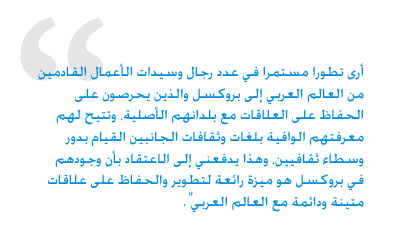 ولكن اسمحوا لي أن أعود إلى ميزة هامة أخرى تقدمها منطقة بروكسل على المستوى الثقافي وتعتبر بعد مهم للغاية عندما نتحدث عن العلاقات التجارية الخارجية، فبروكسل تستفيد من ميزة هائلة هي توفر مجموعة كبيرة من العاملين متعددي اللغات متعودين على العمل في بيئة دولية. وفيما يتعلق بالتجارة والعلاقات الاستثمارية مع الدول العربية على وجه الخصوص، أرى تطورا مستمرا في عدد رجال وسيدات الأعمال القادمين من العالم العربي إلى بروكسل والذين يحرصون على الحفاظ على العلاقات مع بلدانهم الأصلية، وتتيح لهم معرفتهم الوافية بلغات وثقافات الجانبين بالقيام بدور وسطاء ثقافيين، وهذا يدفعني إلى الاعتقاد بأن وجودهم في بروكسل هو ميزة رائعة لتطوير والحفاظ على علاقات متينة ودائمة مع العالم العربي ".
ولكن اسمحوا لي أن أعود إلى ميزة هامة أخرى تقدمها منطقة بروكسل على المستوى الثقافي وتعتبر بعد مهم للغاية عندما نتحدث عن العلاقات التجارية الخارجية، فبروكسل تستفيد من ميزة هائلة هي توفر مجموعة كبيرة من العاملين متعددي اللغات متعودين على العمل في بيئة دولية. وفيما يتعلق بالتجارة والعلاقات الاستثمارية مع الدول العربية على وجه الخصوص، أرى تطورا مستمرا في عدد رجال وسيدات الأعمال القادمين من العالم العربي إلى بروكسل والذين يحرصون على الحفاظ على العلاقات مع بلدانهم الأصلية، وتتيح لهم معرفتهم الوافية بلغات وثقافات الجانبين بالقيام بدور وسطاء ثقافيين، وهذا يدفعني إلى الاعتقاد بأن وجودهم في بروكسل هو ميزة رائعة لتطوير والحفاظ على علاقات متينة ودائمة مع العالم العربي ".
قمتم بتحديد هدف مهم بالنسبة لكم ترغبون بتحقيقه خلال ولايتكم كوزيرة وهو جعل بروكسل "مدينة الإبداع"، قد يكون لهذا فائدة كبيرة للعالم العربي، لأن تحولات الاقتصادات العربية ترحب حاليا بالتقنيات المبتكرة في مجموعة واسعة من القطاعات. ما هي نقاط القوة في منطقة بروكسل العاصمة في هذا المجال؟
الوزيرة فريمون: تستثمر بروكسل حاليا بكثافة في تطوير اختصاصات متطورة تعتمد على نقاط القوة الموجودة في تكنولوجيا المعلومات والاتصالات والعلوم والبيئة، ونحن نولي الكثير من الاهتمام لتطوير هذه البحوث المتصلة بقطاعات الاقتصاد الهامة التي نشعر أنها ستقدم لنا مزايا هائلة في المستقبل.
ودعونا لا ننسى أن المدينة التي تستقبل معظم طلاب الجامعات في بلجيكا تؤوي عددا من الجامعات ذات المستوى العالي (وهذه حقيقة يشهد عليها بالتأكيد حصول البروفسور أنغلير من جامعة بروكسل الحرة مؤخرا على جائزة نوبل للفيزياء إلى جانب عالم الفيزياء البريطاني بيتر هيغز).
في مقابلة حديثة نشرت في مجلة "انتربرنت"، المجلة الشهرية لغرفة تجارة بروكسل، تحدثتم عن تعزيز شبكات منطقة بروكسل العاصمة في البلدان الأجنبية كواحدة من أهم الأولويات في المستقبل القريب. هل يوجد على جدول الأعمال شيء يتعلق بالعالم العربي بشكل خاص؟
الوزيرة فريمون: لدينا تمثيل جيد جدا في العالم العربي بفضل زملائنا من المناطق الفلمنكية أو الوالونية سواء كان ذلك بشكل مباشر أو غير مباشر. نحن موجودون في الجزائر والكويت ولبنان والأراضي الفلسطينية، وكذلك في مصر والعراق وليبيا والمغرب وتونس والمملكة العربية السعودية والإمارات العربية المتحدة. كما أن عدد النشاطات التي نقوم بها فيما يتعلق بالعالم العربي يتزايد باستمرار، فمثلا سيكون هناك بعثة أميرية إلى المملكة العربية السعودية وسلطنة عمان تنظمها وكالةالتجارة الخارجية البلجيكية في شهر آذار/ مارس 2014، وفي المستقبل القريب ستشارك وكالةالتجارة الخارجية والاستثمارات في منطقة بروكسل العاصمة في العديد من الندوات والمحاضرات في العالم العربي ويتبادر إلى ذهني منها تظاهرتان هما أسبوع جيتكس للتقنية ومعرض الصحة العربي في دبي. كما تصلنا الكثير من الدعوات للمشاركة في المناقصات إلى جانب دعوات من المشترين في لبنان والأردن والجزائر والأراضي الفلسطينية وغيرها. وبالإضافة إلى ذلك إن خبرتنا في قطاع النقل العام تجذب طلبا كبيرا جدا في العالم العربي، وهناك عدد من البلدان، مثل الجزائر والمغرب، نعتبرها شريكة اقتصادية في غاية الأهمية لنا ونحن على اتصال دائم معها.
ترأستم مؤخرا بعثة اقتصادية لمنطقة بروكسل العاصمة إلى المغرب، ما هي المجالات الواعدة للتعاون بين الطرفين؟
الوزيرة فريمون: لاقت البعثة الاقتصادية التي نظمناها إلى المغرب في أيلول / سبتمبر نجاحا كبيرا، وقد شاركت فيها أربعين شركة ورافقنا فيها أكثر من خمسين شخصا. وقد أسعدنا اكتشاف أن ثلثي المشاركين كانوا رجال أعمال من أصل مغربي يرغبون في القيام بأعمال تجارية مع بلدهم الأصلي. وكما ذكرت سابقا، نحن ندعمهم إلى أقصى حد ممكن في نشاطاتهم كونهم قادرين على القيام بدور مفيد جدا في تطوير العلاقات بين بروكسل والبلاد العربية.
وأوساط الأعمال في بروكسل ممثلة بالفعل تمثيلا جيدا جدا في السوق المغربية، فعلى سبيل المثال، قامت شركة ترانسورب تيكنيرايل بدور هام في تطوير شبكة الترامواي في الدار البيضاء، وتشارك شركة بيسكس في بناء ميناء طنجة المتوسطي الثاني. وكانت لدى غالبية المشاركين في البعثة خبرة في مجال الخدمات أو التكنولوجيات الجديدة أو الاستشارات، وقد كان من المثير للاهتمام الاستفادة من الخبرات وتبادلها مع رجال الأعمال المغربيين الذين التقينا بهم. وفي نهاية البعثة قرر العديد من المشاركين البقاء في المغرب لفترة أطول قليلا، لأنهم كانوا قادرين على الحصول على مواعيد لم يتوقعوا أبدا أن يكون قادرين على ترتيبها بوقت قصير هكذا. كما أود أن انوه بالاتصالات الجيدة جدا التي ربطتنا مع وزيري النقل والعمل المغربيين خلال البعثة.
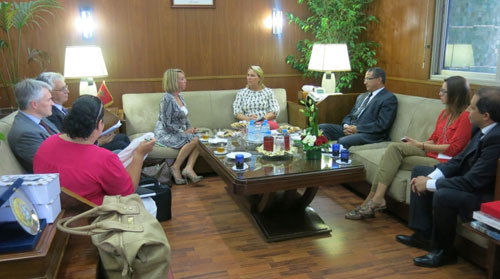
كما ذكرت مسابقا بشكل وجيز، ستشارك منطقة بروكسل العاصمة في بعثة هامة الى المملكة العربية السعودية وسلطنة عمان خلال شهر آذار / مارس 2014، ماهي القطاعات والمواضيع التي تنوون إعطاءها اهتمام خاص خلال هذه البعثة الأميرية؟
الوزيرة فريمون: هناك مجموعة واسعة من القطاعات التي تحتل مكانة هامة في علاقاتنا مع المملكة العربية السعودية وسلطنة عمان: هي قطاعات الهندسة المدنية والبنية التحتية والخدمات الاستشارية والخدمات القانونية والرعاية الصحية وقطاع السلع الفاخرة، وستحوذ خدمات الأعمال على وجه الخصوص بقدر كبير من اهتمامنا. ونحن نعمل بجد حاليا على التحضير للبعثة، ونشعر بسعادة بالغة لأننا لاحظنا اهتمام شركات بروكسل الكبير للمشاركة فيها. وأنا أشعر في الواقع أن البعثة ستكون حاسمة في تنمية العلاقات التجارية والاستثمار مستقبلا بين المناطق البلجيكية وسلطنة عمان والمملكة العربية السعودية.
أنتم أول وزيرة في منطقة بروكسل العاصمة تولي اهتماما خاصا لدور سيدات الأعمال في بروكسل، لماذا ترون أنه من المهم تزويد السيدات صاحبات المشاريع في منطقة بروكسل العاصمة بهياكل دعم خاصة؟ هل هذا موضوع تنوون إثارته أيضا خلال اتصالاتكم مع الدول الأجنبية، وهل ترون إمكانيات تعاون مع العالم العربي في هذا الصدد؟
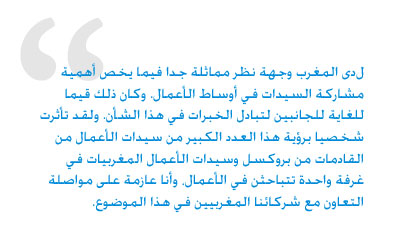 الوزيرة فريمون: لقد لاحظت أن الكثير من المبادرات والتدابير التي وضعت موضع التنفيذ كانت لدعم أصحاب المشاريع في بروكسل بشكل عام، ولكن لم يقترب أي منها من المسألة من وجهة نظر جنس أصحاب المشاريع. وهناك نقص كبير في عدد سيدات الأعمال في منطقة بروكسل حتى يومنا هذا، وهو مجال علينا أن نعمل فيه كثيرا لنلحق بما فاتنا، ولدينا حاليا العديد من المشاريع قيد التنفيذ لتشجيع السيدات على بدء ممارسة الأعمال التجارية ومساعدتهن في تعهداتهن.
الوزيرة فريمون: لقد لاحظت أن الكثير من المبادرات والتدابير التي وضعت موضع التنفيذ كانت لدعم أصحاب المشاريع في بروكسل بشكل عام، ولكن لم يقترب أي منها من المسألة من وجهة نظر جنس أصحاب المشاريع. وهناك نقص كبير في عدد سيدات الأعمال في منطقة بروكسل حتى يومنا هذا، وهو مجال علينا أن نعمل فيه كثيرا لنلحق بما فاتنا، ولدينا حاليا العديد من المشاريع قيد التنفيذ لتشجيع السيدات على بدء ممارسة الأعمال التجارية ومساعدتهن في تعهداتهن.
ومن جهة أخرى، لقد أتيحت لي الفرصة للتركيز على هذا الموضوع بالذات خلال بعثتنا إلى المغرب، حيث تتوفر لديهم وجهة نظر مماثلة جدا فيما يخص أهمية مشاركة السيدات في أوساط الأعمال. والمملكة المغربية النشيطة جدا في هذا المجال كانت قادرة على اتخاذ عدد من الخطوات الإيجابية فيما يتعلق بدور سيدات الأعمال، وكان ذلك قيما للغاية للجانبين لتبادل الخبرات في هذا الشأن. ولقد تأثرت شخصيا برؤية هذا العدد الكبير من سيدات الأعمال القادمات من بروكسل وسيدات الأعمال المغربيات في غرفة واحدة تتباحثن في الأعمال، وأنا عازمة على مواصلة التعاون مع شركائنا المغربيين في هذا الموضوع. كما نرى بالتأكيد إمكانيات التعاون مع الدول العربية الأخرى في هذا الصدد أيضا، وسوف أعمل بجد للتأكد من أن سيدات الأعمال اللواتي لم تتعودن على العمل مع العالم العربي حتى الآن، سوف تنضم إلينا في البعثات الاقتصادية لاكتشاف الفرص التي تلوح في الأفق العربي.
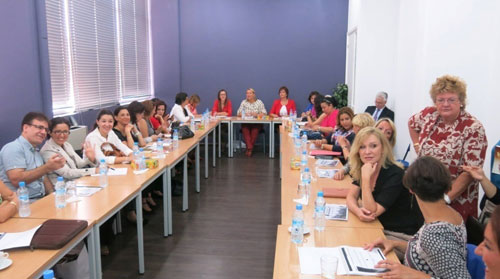
في ختام لقائنا، كيف ترون مستقبل علاقات التجارة والاستثمار بين منطقة بروكسل العاصمة والعالم العربي؟
الوزيرة فريمون: من الواضح لي أن العالم العربي هو شريك أساسي لمنطقة بروكسل، ولبلجيكا والاتحاد الأوروبي ككل. حيث تدل الإحصائيات التجارية على أن الصادرات البلجيكية إلى العالم العربي زادت بنسبة أكثر من 11٪ في عام 2012، وهذا الاتجاه الإيجابي يستمر عام 2013. بينما انخفضت الواردات من العالم العربي بشكل طفيف خلال الأشهر الستة الأولى من عام 2013 (بلغت نسبة تراجع الواردات العربية إلى بلجيكا خلال هذه الفترة حوالي 8 ٪)، غير أنني مقتنعة بأن هذا ظاهرة مؤقتة مرتبطة بالأزمات السياسية التي تشهدها بعض الدول العربية حاليا. وعلاوة على ذلك، أشعر أننا لا يجب أن نركز كثيرا على أرقام الاستيراد والتصدير، بل أن نولي المزيد من الاهتمام لتطوير علاقات ذات اتجاهين مبنية على أساس المصالح المشتركة والثقة وجودة المنتجات والخدمات التي تعود بالنفع على الطرفين. ومن الواضح توفر فرص غنية للتعاون في قطاعات الهندسة والهندسة المعمارية ووسائل النقل والرعاية الصحية، وهذا غيض من فيض.
ونحن سنواصل في وكالة التجارة الخارجية والاستثمارات في منطقة بروكسل العاصمة جهودنا لمواصلة تطوير علاقاتنا مع العالم العربي. وأشعر في الواقع أن الجهات الفعالة مثل الغرف التجارية لها أيضا دور هام في هذا الصدد، فهي تسهل الاتصالات بين رجال الأعمال جنبا إلى جنب مع المسؤولين عن المناطق البلجيكية لضمان متابعة جيدة للبعثات الاقتصادية بهدف إقامة علاقات قوية ومستديمة.
مع هذه الكلمات المشجعة تركنا وزيرة تتميز برؤية واسعة لمنطقة قد تكون صغيرة الحجم ولكن كثيرة الإمكانيات والاحتمالات، لتعود إلى عملها.
لمزيد من المعلومات:
www.brussels.irisnet.be/en/
www.invest-export.irisnet.be/en/
www.innoviris.be
INNOVATION: A BUZZ WORD... OF IMPORTANCE
Three Success stories from the Arab World
In case the proliferation of lists and rankings that aim to identify the 100 most innovative states, regions, corporations and institutions has not yet rang a bell: being labeled an innovator is a much-sought after prize in today’s business world. And rightly so. Innovation is what helps companies stay ahead of their competitors, and, perhaps more importantly, one of the most important tools we have at our disposal for attaining a certain quality of life amid the myriad of challenges we are confronted with in a day and age which is characterized by globalization, technological revolutions, migration, and ecological problems that require our urgent attention.
As was underscored in a previous edition of the ABLCC newsletter by Mr. Jean-Claude Marcourt, Minister of Foreign Trade and New Technologies of the Walloon Region, innovation is born from synergies, from sharing expertise and collaborating on a global level. In two words, from transcending borders. We agree, and went looking for inspiring examples of strong innovation and entrepreneurship efforts on the other side of the Mediterranean. The need for coming up with a new type of development strategy to help countries grapple with the challenges that confront them – not in the least soaring unemployment rates – has all but fallen on deaf ears in the Arab world.
Indeed, as is mentioned on the Global Innovation Index 2013 Blog (http://www.globalinnovationindex.org/content.aspx?page=blog ), efforts to attract high-quality education institutions and foster the attractiveness of the region for innovative talents clearly remain a priority in the GCC region, and the Arab world as a whole. This was also noted by researchers of the World Banks’ Center for Mediterranean Integration (CMI), who identified three success stories of local innovation projects in the Arab world in their report “Local Innovation Dynamics: Examples and Lessons from the Arab World” (Jean-Eric Aubert, Tamer Taha, and Anuja Utz, The Global Innovation Index 2013, The Local Dynamics of Innovation, ‘Local Innovation Dynamics: Examples and Lessons from the Arab World’, Cornell University, INSEAD, and WIPO, Geneva, Ithaca, and Fontainebleau. http://www.globalinnovationindex.org/content.aspx?page=gii-full-report-2013#pdfopener ): The Elgazala Technopark in Tunisia, which specializes in information and communication technologies (ICTs), Haliopolis in Morocco’s Agadir, an agrifood cluster, and the city of Dubai, which has particularly witnessed dynamism in service innovation.

According to the CMI, the recipe for success underlying all three cases consists in a combination of efficient government action, dynamic interactions among local actors (meaning collaboration between industry and the on-site academic and research institutions), internationalization of the sites, a focus on (potential) competitive advantages of the sites, and a sustained effort for attaining diversification and renewed sources of growth. The CMI furthermore underscores the importance for governments to be visionary catalysts rather than ‘hands-on’ investors (a process which can be usefully stimulated by an exchange of good practices, study tours, and so on within the region and with other parts of the world), to be international integrators, by inserting actors into the global economy by all means possible, including regional integration processes, and to be clever strategists, who begin with fine-tuned and focused rather than grandiose projects. Join us in discovering inspiring examples of local innovation dynamics in the Arab world.
Elgazala Technopark: putting Tunisia’s ICT sector on the map
The World Bank researchers count about one hundred firms that have set up camp in the park, among them thirteen multinationals, including Microsoft, Huawei, Alcatel-Lucent, and Stonesoft, a steep increase from the twenty-five companies it harbored in 2002
Launched in 1999 as part of Tunisia’s national strategy to develop the ICT sector, Elgazala Technopark park is home to a business incubator, a research centre dedicated to the ICT industry, various telecommunication schools, including two doctoral schools, and several research divisions dealing with ICT-related disciplines: telecommunications systems, network engineering, mobile networks, information systems, and business communications. Several national agencies—such as the National Electronic Certification Agency and the National Frequency Agency— also set up camp in the technopark to cater to the needs of ICT companies. The park’s self-set goals, which include establishing Tunisia as a player to reckon with in the ICT sector across the Mediterranean basin, promoting the export of services and products based on the Tunisian grey matter, and developing and spreading the use of ICT in the various economic sectors in Tunisia, seem to come within reach a little more every day. According to the CMI, the number of employees working in the technopark has increased from five hundred in 2002 to about two thousand currently, 70 per cent of whom have a Master-level degree in engineering, or an equivalent degree. Moreover, the World Bank researchers count about one hundred firms that have set up camp in the park, among them thirteen multinationals, including Microsoft, Huawei, Alcatel-Lucent, and Stonesoft, a steep increase from the twenty-five companies it harbored in 2002. And, the report adds, 67 per cent of these personnel are working in a private sector entity.
The CMI identifies the Elgazala environment as highly conducive to technology transfer, a characteristic that resulted in the set up of numerous intra-company partnerships and joint participation in calls for proposals and consultations. Moreover, it notes the existence of an influential spillover effect on the quality of the output produced by the companies in the technopark, with 75 per cent of production taking place in the technopark in areas such as software and information technology solutions and services being destined for export. The success didn’t go by unnoticed, as the Tunisian government decided in 2008 to erect two new technology parks in the suburbs of Tunis, and has plans to replicate the Elgazala model for other sectors. In this framework, the report refers to the textile and clothing sector at the Monastir cluster, renewable energy, water, and biotechnology at Borj Cedria Technopol, and agrofood industries at the Bizerta technology park located in the north of the country.
Agadir’s Haliopolis: innovation as an engine for competitiveness in the fisheries sector
Haliopolis aims to enhance forward linkages in the seafood-processing industries, such as in packaging, conditioning and the provision of logistics services. Although the project is still in its early stages, all lots of the first phase were sold by the end of September 2012 for twenty-one projects covering different segments of transformational processing, such as deep-freezing, preserving, producing flour and fish oil, and processing algae
In Morocco, where industrial development strategies and infrastructure improvements have been sitting high on the agenda over the past decades, it is to the city of Agadir, capital of the Souss-Massa-Draâ region and home to a well-developed agro-food sector, that the CMI draws attention. According to the report, the city has been chosen to host the country’s first fishing and processing seafood cluster because of its high growth potential in this field, in addition to its location (it is near to Agadir harbor and the International Airport, and connected to northern Morocco by an expanding highway network) and know-how in seafood processing.
At the heart of a strategy dedicated to boosting the contributions of the fisheries sector to the Moroccan national economy, we find the Haliopolis Park, which was established in 2009 to cluster all actors in the value chain of the seafood processing, and to integrate various actors as sources of innovation. According to the CMI, the park is registered as a company with stockholders from the private sector and aims to enhance forward linkages in the seafood-processing industries, such as in packaging, conditioning and the provision of logistics services. Although the project is still in its early stages, all lots of the first phase were sold by the end of September 2012 for twenty-one projects covering different segments of transformational processing, such as deep-freezing, preserving, producing flour and fish oil, and processing algae. Using innovation as an engine for competitiveness, Haliopolis offers support to R&D projects for companies within the cluster to improve their research skills and to create partnerships with research institutions. It is argued that the park’s successful performance – the report directly links its establishment to Morocco’s current status as one of the largest producers and exporters of seafood in Africa – has been in no small part the result of the promotion of technological innovation, the increased effectiveness of support measures provided to companies seeking new markets, and the development of logistics to optimize costs and improve connectivity of Morocco with different destinations, especially the African market. The conclusion is that the Agadir success story is largely the consequence of an excellent synergy between actions taken by dynamic industrial and agricultural communities on one hand, and efficient government policies on the other, combining adequate investments in infrastructure and appropriate support for innovation and export.
Dubai: (back) on track thanks to innovation
TECOM Business Parks comprises ten interconnected business parks arranged in five industry clusters: the ICT, Media, Education,Sciences, and Manufacturing and Logistics sectors. According to the report, some 4,500 businesses have taken part in these clusters and business parks, not only because of the state-of-the-art infrastructure available, but also as a result of generous incentives provided by the government
Also in Dubai, it was well understood that the establishment of a well-diversified economy through stimulating innovation is the way to go. The CMI argues that Vision 2010, which aimed to lead the Emirate on the path towards a knowledge-based economy, and the Dubai strategic Plan 2015, which strives for the attainment of social, economic and environmental sustainability, have significantly bumped up the GDP share of knowledge-based industries and services between 1995 and 2012 in tourism, financial services, manufacturing and transport, and storage and communication, which accounted for 4%, 11.3%, 14.2%, and 14% of GDP in 1995, 2000, 2011, and 2012, respectively.
And also in Dubai, companies aren’t ignorant of the beneficial effects of business parks. The CMI puts the spotlight on TECOM Investments, a member of Dubai Holding and a global company dedicated to the development of knowledge industries and business growth, which it does in part through TECOM Business Parks. It more particularly comprises ten interconnected business parks arranged in five industry clusters: the ICT, Media, Education,Sciences, and Manufacturing and Logistics sectors. According to the report, some 4,500 businesses have taken part in these clusters and business parks, not only because of the state-of-the-art infrastructure available, but also as a result of generous incentives provided by the government. It states that Dubai has also emerged as a dynamic financial hub for the region, hosting many banks and insurance, financial, and legal service firms. The government established the Dubai International Financial Center (DIFC), a free zone regulated by its own independent commercial and civil laws and under the United Arab Emirate constitution, which provides a competitive operating environment that offers many advantages, including the possibility of full foreign ownership, a 0% tax rate on income and profits (guaranteed for a period of 50 years from 2004), and no restrictions on the repatriation of income and profits. Regulations which, according to the CMI, have opened the door for financial institutions to start introducing financial innovations to the market, notably in Islamic finance. After the global financial crisis, real estate speculation and huge debts put a question mark behind the growth model espoused by the Emirate, it appears to the CMI that Dubai has recovered and is now continuing its trajectory on a modest growth path. Their recommendation for ramping up Dubai’s growth to levels formerly witnessed in the Emirate, and more? You guessed it: intensively exploring new areas in high-tech and R&D activities, and developing top-notch higher education programmes to educate a cadre of highly skilled people. The current day economic scenario is confronting many states and regions in the world with tough challenges, but there’s a powerful medicine that’s up for curing a lot of the troubles ailing the economy, and since times immemorial, its label reads “innovation”.
New ABLCC Services
Visa Service and Registration of Documents for Saudi Arabia

The Chamber is delighted to provide a visa service to Belgian and Luxembourgish citizens and persons legally residing in Belgium or Luxembourg who want to undertake business travels to, or work in, Saudi Arabia. You are welcome to contact the Chamber for more information on the visa obtainment procedure.
Fees for visa service: €50 (VAT not included)
Member advantage: ABLCC members can simply drop off and pick up their documents at the Chamber within 48 hours, or have them sent to them by mail, and save valuable time. For ABLCC members, the Chamber takes care of the document certification at the Saudi Embassy. The ABLCC is not responsible for any possible delays in visa issuance.
Since recently, the ABLCC is also authorized by the Kingdom of Saudi Arabia to register all documents for which you have to obtain legalization at the Saudi Consulate in Brussels.
Fees for document registration: €10 members - €15 non-members (VAT not included)
Don’t hesitate to contact us for information on the visa obtainment and/or document registration process.
Tel.: +32 (0)2 344 82 04 – E-mail: This email address is being protected from spambots. You need JavaScript enabled to view it.
Facilitation of Business Cooperation through the EEN Business Cooperation Database
 Looking for business contacts in the Arab world? The ABLCC is your first point of contact! Over the years, the ABLCC has managed to develop a strong network in the Arab world comprising businesses, officials, diplomats, trade associations, financial institutions and chambers of commerce on all levels.
Looking for business contacts in the Arab world? The ABLCC is your first point of contact! Over the years, the ABLCC has managed to develop a strong network in the Arab world comprising businesses, officials, diplomats, trade associations, financial institutions and chambers of commerce on all levels.
Thanks to Enterprise Europe Brussels, the ABLCC can now also offer its members access to the Business Cooperation Database of Enterprise Europe Network (EEN), one of the world’s largest tools for business matchmaking. Contact us to obtain your Business Co-operation Proposal Form and have your company profile published in the EEN Business Cooperation Database. The kind collaboration of BECI/Enterprise Europe Brussels enables us to send you the expressions of interest of companies established in the Arab world for your company profile.
More information:www.brusselsnetwork.be (Enterprise Europe Brussels)
Contact us atThis email address is being protected from spambots. You need JavaScript enabled to view it.
Would you also like to benefit from these and other ABLCC services? You can. Become a member and enjoy the full range of advantages offered by the ABLCC.
Brochure and subscription form
Brochure en inschrijvingsformulier
Brochure et demande d’adhésion
مزايا الانضمام لعضوية الغرفة و طلـب انتســـاب الغرفة
You are welcome to return the completed form to us by e-mail (This email address is being protected from spambots. You need JavaScript enabled to view it. ) or fax (32 2 347 57 64).
يرجى إعادة الاستمارة لنا بعد تعبئتها بشكل كامل بالبريد الالكتروني (This email address is being protected from spambots. You need JavaScript enabled to view it. )
أو بالفاكس (32 2 347 57 64)
Chamber News and recent Activities
Last respects paid to Mr. Willy Monfils, former Chairman of the ABLCC Board of Directors
We deeply regret to inform you of the death of Mr. Willy Monfils, former Chairman of the Board of Directors of the ABLCC. Throughout a distinguished career, Mr. Monfils was involved in the promotion of foreign trade, including as Director General of the Belgian Foreign Trade Office(OBCE). A renowned specialist in economics and international cooperation, Mr. Monfils was also the founder of the Belgian Association of Chambers (ABEC), while taking up the presidency of our Chamber between 1992 and 2009. His remarkable experience, total commitment and human qualities mark forever the memory of his beloved ones and colleagues.
The Chamber presents its sincerest condolences to the spouse and family members of Mr. Monfils, who will be deeply missed.
Seminar “Investment and Business Opportunities in Iraq”
Brussels – 7 October 2013
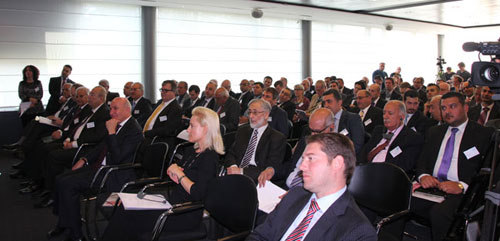
On the 7th of October, the Embassy of the Republic of Iraq in Brussels, the Arab-Belgian-Luxembourg Chamber of Commerce (ABLCC) and the Belgian Federation for the Technology Industry AGORIA organized a seminar entitled “Investment and Business Opportunities in Iraq” with the participation of a ministerial and high level delegation from Iraq, high level representatives of the European Commission, the Belgian Ministry of Foreign Affairs and business delegations from Iraq, Belgium and Luxembourg.
H.E. Dr. Rowsch Nuri Shaways, Deputy Prime Minister of Iraq, opened the seminar with an overview of important developments that have taken place in Iraq over the last year, underlining the continuous efforts of the Iraqi government to develop a productive and sustainable economy. Warm words of welcome were also pronounced by the organizers of the seminar, H.E. Mr. Mohammed Al Humaimidi, Ambassador of Iraq to Belgium, Luxembourg and the EU, Mr. Pieter Jan Provoost, Director of the Carbon Energy Club at AGORIA and Mr. Qaisar Hijazin, Secretary General of the ABLCC.
The reality of Investing in Iraq
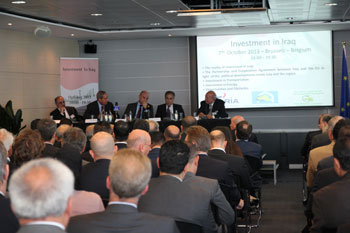 Moderated by Mr. Ghassan Ejjeh, Vice President of BESIX and member of the ABLCC Board of Directors, the opening workshop tackled the Iraqi Investment environment as well as benefits, guarantees, and exemptions offered in the Iraqi investment laws.
Moderated by Mr. Ghassan Ejjeh, Vice President of BESIX and member of the ABLCC Board of Directors, the opening workshop tackled the Iraqi Investment environment as well as benefits, guarantees, and exemptions offered in the Iraqi investment laws.
H.E. Dr. Sami Al Araji, Head of the National Investment Commission in Iraq, presented the 2013-2017 National Development Plan outlining the measures that should allow Iraq to benefit to the largest extent possible from the continuously improving macroeconomic situation and tackle obstacles to investment.
According to Mr. Herish Muharam, Head of the Investment Commission in the Kurdistan Region, and Dr. Ali Al Sindy, Minister of Planning in the Kurdistan Region Government, the latter region constitutes a forerunner in the country in terms of macroeconomic developments. The needs of the Kurdistan Region and a plan for action are identified in the Socio Economic Investment Need Analysis released by the Ministry of Planning of the Kurdistan Region and the UNDP in September 2013, and in the Kurdistan Vision 2020.
Investment opportunities also abound in Najaf, as was pointed out by H.E. Mr. Wafy Al-Bahash, Head of the Najaf Province Investment Commission. The province aspires to enhance development in the IT and communications sector, and is heavily investing in the development of infrastructure for cities, hotels, universities and other projects. More information about investing in Najaf can be found on www.investnajaf.com
Presentation of H.E. Dr. Sami Al- Araji, (National Investment Commission in Iraq)
Presentation of H.E. Mr.Ali Al- Sindi (Ministry of Planning - Kurdistan region)
Presentation of H.E. Wafy Al-Bahash (Najaf Province Investment Commission)
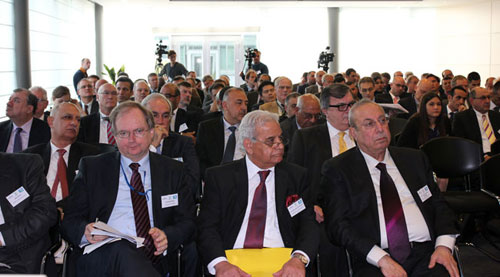
The Partnership and Cooperation Agreement between Iraq and the EU in the light of political developments in Iraq and the region
The EU is the second trading partner of Iraq, accounting for 20.7 % of Iraqi trade, while also ranking second internationally in terms of exports to the country where the Tigris and the Euphrates meet. Financial support from the EU has amounted to almost one billion euro since 2013, covering both reconstruction and humanitarian assistance.
Mr. Christian Berger, Director for the Middle East at the European Commission’s External Action Service, explained that the EU has a long-standing commitment to support Iraq in its reconstruction and transition to democracy. EU overall support to Iraq since 2003 has amounted to over 1 billion euro, not counting the bilateral contributions of Member States. Moreover, a new chapter of the bilateral relationship has been inaugurated through the signing of the Partnership and Cooperation Agreement (PCA) in May 2012.
In addition to the PCA, the EU Framework Program for Research and Innovation called “Horizon 2020” and initiatives such as the EU-Iraq Energy Center will provide a useful framework for the development of business activities in Iraq, according to Mr. Khalid al Khero, Deputy Head of the Department for Europe at the Iraqi Ministry of Foreign Affairs.
Commenting on the excellent Belgian-Iraqi bilateral relations, Mrs. Michèle Deneffe, Director for the Middle East and North Africa at the Belgian Ministry of Foreign Affairs, stated that a Belgian Honorary Consul will be appointed to facilitate business contacts between both countries. Mrs. Deneffe also referred to the MoU on Bilateral Political Consultations that was concluded at the beginning of 2013 and which will allow for the organization of political consultations on questions of common interest at the level of high civil servants once a year, alternatively in Brussels and Baghdad. Meanwhile, high level political contacts continue to take place on an ad hoc basis.
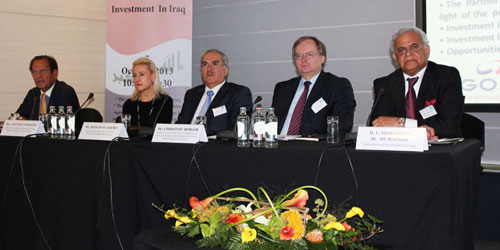
Investment in Transportation
Moderated by Mr. Henrik Hololei, Head of Cabinet at the DG Transport of the European Commission, the workshop on Investment in Transportation discussed opportunities linked to the development of the Al-Faw Grand Port and Iraq’s Dry Canal Project, amongst other projects. According to Dr. Al Araji, the former is to become one of the most important ports of Asia over the next 5 to 6 years, and will be embedded in an economic zone covering the chemical, petrochemical and logistics sectors. Investment opportunities also abound in the airport and railroads sectors.
Turning from Iraqi to Belgian ports, Mr. Albert Pegg, Senior Advisor at the Port of Antwerp, explained what the latter has on offer for Iraqi shippers and receivers. Handling 184 million ton per year and harboring a large number of specialized logistic companies, the Port of Antwerp can call itself the primary hub for cargo originating in Europe and the market leader in break bulk to and from all sailing areas. The port moreover offers international training and consultancy.
Presentation of Mr. Albert Pegg (Port of Antwerp)
Investment in Energy
Michael Hager, Head of Cabinet at DG Energy of the European Commission served as ‘Master of Ceremony’ for the workshop on Investment in Energy, in which Advisor to the Iraqi Ministry of Oil, Mr. Ihsan Al Attar, and his colleague at the Ministry of Electricity, Mr. Adel Hamid, shed light on Iraqi oil contracts, gas investment in the light of the Iraqi-EU PCA, Iraq’s Strategic projects in oil and gas sectors (including the Basra-Haditha-Aqaba pipeline project), the Oil and Gas Law, and the Iraqi Centre of Excellence and the Energy Academy.
Mr. Koen van Peteghem, General Manager at EMEA and in charge of Iraq-related projects at ABLCC member company CG Holdings Belgium, shared with the audience the product portfolio of CG, a global leader in the management and application of electrical energy, covering the entire value chain of engineering offerings.
Presentation of Mr. Koen van Peteghem, (EMEA, CG Holdings Belgium)
Presentation of Mr. Adel Hamid, (Iraqi Ministry of Electricity)
Investment in Iraq: Opportunities and Obstacles
The concluding workshop, moderated by Dr. Al Araji, aimed to shed light on the Iraq Investment Law, the effect of government intervention on the investment process, the security situation, infrastructure required to create an appropriate investment environment, and financial and administrative corruption.
Mr. Waleed Eidi, Director General of the Department of Statistics at the Central Bank of Iraq and Mr. Selim Haddad, Commercial Manager at ABLCC member company Byblos Bank Europe, moreover discussed in detail the Iraqi Economy and the state of the Iraqi banking sector.
Another ABLCC member company that shared its extensive experience in the Iraqi market was environmental solutions provider WATERLEAU. Vice President Sales and Marketing Mr. Willy Gils discussed the opportunities and obstacles encountered by his company when helping municipal and industrial clients in Iraq to go green.
Presentation of Mr. Willy Gils (WATERLEAU)
Presentation of Mr. Selim Haddad (Byblos Bank Europe)
Presentation of Mr. Amer Farhan Al-Mohammedi (Anbar Province Investment Commission)
Wrapping up the seminar, Deputy Prime Minister H.E Dr. Rowsch Nuri Shaways expressed the wish that a mutually beneficial partnership would develop between business communities from both sides in a wide range of sectors. A representative of H.E. Mr. Didier Reynders, Deputy Prime Minister and Minister of Foreign Affairs, Foreign Trade and European Affairs of Belgium, who had to be excused, expressed the Belgian Minster’s wish to witness the creation of a concrete agenda and mutually beneficial cooperation in the framework of the MoU on Bilateral Political Consultations.
The seminar was followed by a reception allowing attendees to continue networking activities over a drink and a bite to eat. Moreover, companies were given the opportunity to engage in bilateral meetings.
More information: A detailed overview of benefits, guarantees and exemptions available under the Iraqi investment laws can be found in the 2013 Investor Guide to Iraq, available through www.investpromo.gov.iq
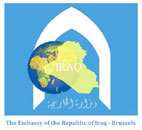 |
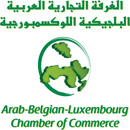 |
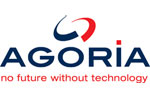 |
Seminar: ICT Outsourcing in Palestine
Brussels - 31 October 2013
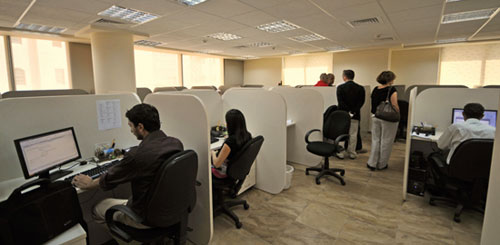
Impressed by the large number of companies who are outsourcing ICT services to Palestine, BIE and AGORIA felt an information session on the booming Palestinian ICT sector has been long overdue. Under the expert eye of Mr. Gino Nale, Economic Attaché for Brussels and the Walloon region in charge of Israel and Palestine, a number of important actors from the field recently gathered in Brussels to outline the advantages offered by the Palestinian ICT sector, which can count Intel, Cisco, Microsoft, Mellanox, Volvo and Winbod, to name a few, among its satisfied customers. Well aware of the benefits offered by the sector, Mr. Nale also announced he is considering the organization of a trade mission taking Belgian companies to Ramallah for B2B meetings with Palestine ICT companies.
According to AGORIA, the Belgian Federation for the Technology Sector, companies with experience in outsourcing ICT services to Palestine have established an ability to reduce project and management costs, speed up the market entree of their products, reduce the time span and energy needed for developing soft ware projects, ensure a high output quality, provide services to their own organizations as well as to clients very fast, and reduce costs related to education and start up in the framework of new projects.
The reasons that underlie these findings were outlined by Mr. Mohamed Musleh, Business Development Manager at the Palestinian Information Technology Association of Companies (PITA). According to Mr. Musleh, approximately 250 companies are active in the sector, which has a market size of around USD 500 million and accounts for no less than 10% of the GDP. He particularly stressed the high quality of available human resources, as many Palestinian employees in the sector master multiple languages, including English, French and German, enjoyed a high quality education and are extremely motivated to comply with their clients’ demands. Moreover, as a result of their connections with foreign diasporas, Palestinian employees generally are familiar with the European (business) culture.
The floor was then given to Mr. Murad Tahboub, Managing Director at ASAL Technologies, a leading software development house in Ramallah with over 130 engineers offering software development services to the international market. Mr. Tahboub outlined the main services offered by ASAL, which include software development and software QA and testing, local system integration including on-site support and on-line administration support for international company projects' in the Middle East, and hardware design testing and validation.
Among ASALS’ many satisfied customers we can find Cisco International, whose CSR Manager, Mr. Gai Hetzroni, discussed the collaboration between Cisco Systems Israel and ASAL on ANA platform development and testing. Starting out as a corporate social responsibility project, the collaboration quickly developed into a ‘regular’ business relationship, after Cisco having taken note of the efficiency with which ASAL was able to achieve the goals and deadlines set for the project.
Those who have missed out on the seminar should keep an eye on the next edition of our newsletter, which will include a focus on the ICT Sector in Palestina, featuring interviews with experts from the field.
From 15 until 18 December 2013, the 2013 Expotech Technology Week will be taking place in Ramallah and Gaza. Find our more via www.expotech.ps
For now, you can find more information on ICT outsourcing to Palestine via the following links:
ASAL Company Presentation
www.pita.ps
AGORIA – Mogelijkheden voor IT Outsourcing in Palestina
AGORIA – Les Possibilités d’Outsourcing IT en Palestine
Feel free to contact us and get in touch with important actors in the Palestine ICT sector!
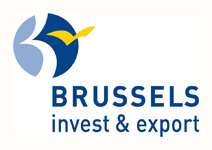 |
 |
ABLCC Board of Directors Meeting and Lunch Conference : “Relations between Belgium, Luxembourg and the Arab Countries: New Prospects”
Brussels – 14 November 2013
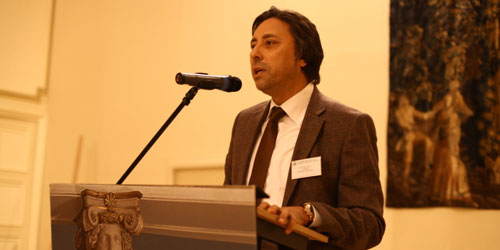
After the conclusion of the ABLCC Board of Directors meeting, during which the Board Members were pleased to establish that the Chamber enjoys a sound financial situation which allows it to undertake an increasing number of activities, Secretary-General Mr. Qaisar Hijazin opened the lunch conference by assuring ABLCC members of the Chamber’s continuous engagement in offering them a range of high quality services which are regularly evaluated according to their needs. Before leaving the floor to H.E. Mr.Samir Addahre, Ambassador of the Kingdom of Morocco to Belgium, who was congratulated with his recent appointment as Dean of the Arab Diplomatic Corps in Belgium, the Secretary General encouraged all members to take very seriously the standard phrase “don’t hesitate to contact us” often used in ABLCC correspondence.
Mr. Addahre started out his presentation by examining trade relations between Belgium and Luxembourg on the one hand, and the Arab world on the other. Noting a positive evolution of exports to Arab countries from Belgium (increase of 11% in 2012 compared to 2011) and Luxembourg, (increase of 8%), the ambassador noted that Belgium realized a particularly important evolution in terms of exports to Oman (increase of 113%), Libya (178%) and Yemen (133%).
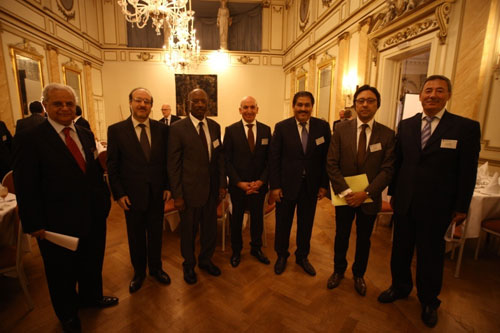
The dean also directed his attention to the imports coming from Arab countries, where he established a low evolution. He specified that imports of Belgium in transport equipment knew a three-digit evolution (322% between 2011 and 2012), while other products, most notably animal and food-processing products, witnessed a clear regression. According to the Ambassador, Bahrain was one of the countries that succeeded in giving a firm boost to exports towards Belgium, as it was able to book a 548% increase over the same period.
Although Mr. Addahre sees ample reason to be delighted with the quality of relations existing between both regions, he hoped to be able to further develop ties on economic and political levels through a deepening of political dialogues, which should result in “more mergers of points of view, to tackle the transverse problems we are facing”. According to the Ambassador, this challenge should be confronted through supporting the modernization processes which are currently being set up in several Arab countries, as well as through the promotion of common values.
On his turn, the Ambassador also concluded his presentation by assuring all ABLCC members they would find a willing ear with the Arab diplomatic corps for all their questions relating to Arab countries.
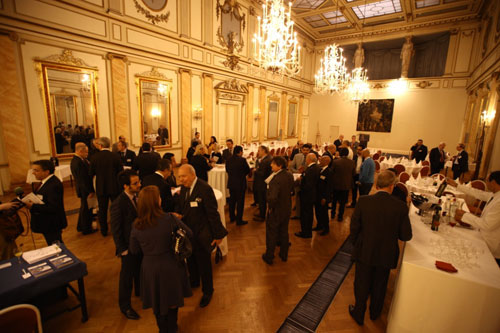
Arab Delegation Visit to the Audi Factory
Forest – 14 November 2013

The Arab Members of the ABLCC Board of Directors who courageously traveled to Brussels during those rainy days that sometimes characterize Belgian autumn, as well as the Arab Ambassadors accredited to Brussels, were offered the possibility to participate in a guided tour through the Audi Factory located in Forest (Brussels) to witness from close-by the production process of the Audi A1, a model which is exclusively produced in Belgium.
Participants marveled at the spectacular sights offered by the bodywork and assembly sites of the factory, which has a daily capacity of over 500 units. During the period 2008-2010, EUR 300 million has been invested in the Brussels factory for the production of the A1 model.
Upcoming Events
Seminar: Business Opportunities in Muslim Countries with the Islamic Development Bank Group
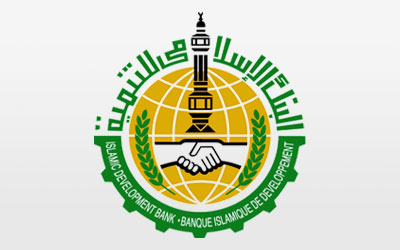
4 December 2013
Brussels
You are undoubtedly familiar with international financial organisations such as the World Bank, the African Development Bank and the European Investment Bank. But what about the Islamic Development Bank (IDB)? And are you aware that the Islamic Corporation for the Development of the Private Sector (ICD), a multilateral organization affiliated with the IDB Group, has its finger on the pulse of the private and public sector and can provide companies with information about opportunities for collaboration in the framework of projects that are in the pipeline in the Arab world?
If you want to learn more about the IDB and ICD and what they can do for your company, you are most welcome to join us for the seminar “Business Opportunities in Muslim Countries with the Islamic Development Bank Group” which is being organized by BECI in collaboration with the ABLCC and with the support of Brussels Invest & Export and AWEX on the 4th of December in Brussels.
Programme:www.beci.be
Registration:This email address is being protected from spambots. You need JavaScript enabled to view it.
Fees: € 50 for members of BECI and ABLCC (VAT not included) €80 non – members (VAT not included)
Contact: +32 (0)2 643 78 12
Venue: BECI, Avenue Louise 500 – 1050 Brussels, Belgium
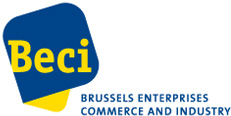 |
 |
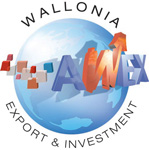 |
 |
Fit Exportdagen Afrika en Midden Oosten
4-6 December 2013
Mechelen
Van 4 tot 6 december organiseert Flanders Investment & Trade (FIT) de “Exportdagen Afrika en Midden-Oosten”. Bespreek in Mechelen uw uitvoerkansen met de FIT-vertegenwoordigers, inclusief medewerkers van BIE & AWEX , voor Egypte, Libië, Marokko, Zuid-Afrika, Bahrein, Iran, Jemen, Oman, Qatar, Saoedi-Arabië, Verenigde Arabische Emiraten, Algerije, Ethiopië, Ivoorkust, Kenia, Kongo, Tunesië, Irak, Jordanië, Koeweit en Libanon.
Deze exportdagen zijn een unieke kans om alle FIT-vertegenwoordigers in één bepaalde regio, samen onder één dak te treffen en uw uitvoerkansen met hen af te toetsen.
Naast de individuele gesprekken heeft u ook de mogelijkheid om deel te nemen aan het seminarie "Afrika : van Casablanca tot Kaapstad" op woensdag 4 december 2013 en het seminarie "Gevolgen van de Arabische Lente" op donderdag 5 december 2013.
Klik hier voor meer informatie en inschrijvingen.
Inschrijven kan tot en met 2 december 2013.
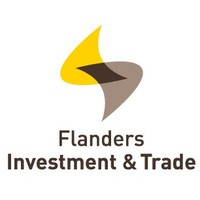
Brussels Best Exporter 2013 Call for Applications

Deadline:
17 December 2013
Organized by BIE and BECI, the "Brussels Best Exporters 2013" event puts Brussels companies that achieve remarkably good results in foreign markets, both in terms of products and services, in the spotlights.
Seeing that Belgian exports to the Arab world have witnessed a significant increase over the past year, we have good reason to assume that our Brussels based member companies stand a fair chance of being crowned best exporter!
Registration:www.bruxellesinvestexport.be
Deadline: 17 December 2013
More information: Mr. Stéphane Decoster, Head of Communication BIE
T: +32 2 800 40 50 – E: This email address is being protected from spambots. You need JavaScript enabled to view it.
 |
 |
Belgian Economic Mission to Saudi Arabia and Oman
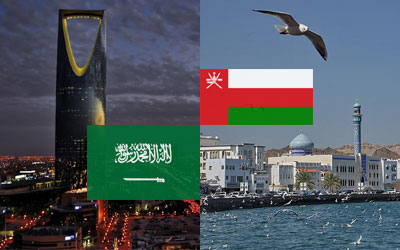
14-21 March 2014
Saudi Arabia and Oman
A multi-sectoral economic mission to the Kingdom of Saudi Arabia and the Sultanate of Oman will take place from 14 until 21 March 2014 under the chairmanship of HRH Princess Astrid, Honorary Chairman of the Belgian Foreign Trade Agency (ABH-ACE). The mission is organized by the ABH-ACE in close cooperation with the regional foreign trade agencies AWEX, BIE and FIT.
The Belgian delegation will be visiting Riyadh, Jeddah, Muscat and Duqm. Taking into account the specific characteristics of the local market, a particular focus will be placed on the following sectors:
- Infrastructure and transport
- Logistics and cold chain
- Cleantech, renewable energy and environmental technologies
- Health care (medical, pharmaceutical and biotechnology)
- Information and communication technologies
- Services (legal, banking and insurance)
- Luxury products, including gastronomy
Companies active in other sectors than the above are of course equally welcome to participate.
The participants will enjoy the support of the Economic and Trade Attachés based in the Kingdom of Saudi Arabia (also covering the Sultanate of Oman), who will be in charge of organizing business appointments tailored to the participants’ requests. Every stage of the princely mission will also include networking and matchmaking activities.
Registration: http://www.flexmail.eu/f-a22e536b367d6812
Deadline: 24 January 2014
More information:www.abh-ace.be
Contact: Mr. Wouter Decoster, Junior Economic Mission Coordinator
T: +32 2 206 35 74 – E: This email address is being protected from spambots. You need JavaScript enabled to view it.
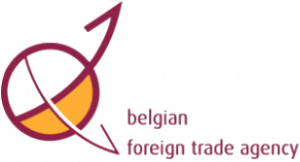 |
 |
 |
 |

Fairs, Conferences and Exhibitions
Saudi Water and Power Forum
Jeddah – 1-3 December 2013
Contact: www.ksawpf.com
Iraq Health Care
Baghad – 1-3 December
More information: www.ifpiraq.com/exhibition_overview.php?id=318
4th Basra Oil & Gas International Conference and Exhibition
Basra – 5-8 December 2013
More information: www.basraoilgas.com
2nd Arab Innovation Network Annual Conference (AINAC)
Sweimeh, Jordan – 6-7 December 2013
More information: http://www.arabinnovation.net/conference/ainac-2013/
Commercial Vehicles Middle East
Dubai – 9-11 December 2013
More information: www.commvehicles.com
2013 Expotech Technology Week
Gaza and Ramallah – 15-18 December 2013
More information: www.expotech.ps
Halal Middle East Exhibition
Sharjah – 16-18 December 2013
More information: www.face2face-event.com/conferences.php
Bahrain International Airshow
Manama – 16-18 January 2013
More information: www.bahraininternationalairshow.com/trade/
Arab Health
Dubai – 27-30 January 2014
Flanders Investment and Trade neemt deel met een groepsstand.
Meer informatie: http://www.flanderstrade.be/acties/2014/01/27/Groepsstand-Arab-Health-Dubai?opendocument
Pour de plus amples informations sur le stand collectif de BIE, visitez: http://www.invest-export.irisnet.be/web/export/-/emirats-arabes-unis-arab-health-27-30-janvier-2014
More information: www.arabhealthonline.com/en
Green Building Expo
Doha – 28-30 January 2014
More information: www.greenbuildingexpo.org
31st Khartoum International Trade Fair
Khartoum – 30 January-6 February 2013
More information: www.ifksudan.com/english , Contact: This email address is being protected from spambots. You need JavaScript enabled to view it.
Saudi Plastics and Petrochem
Riyadh- 17-20 February 2014
More information: www.saudippp.com
Agriculture and Automatisation Fair
Baghdad – 14-21 March 2013-10-31
Contact: This email address is being protected from spambots. You need JavaScript enabled to view it. , This email address is being protected from spambots. You need JavaScript enabled to view it.
Arab Oil & Gas 2014
Dubai – 17-19 March 2014
More information: www.ogsonline.com
Sharjah Chamber of Commerce and Industry World Trade Week
Sharjah - 19-28 March 2014
Contact: This email address is being protected from spambots. You need JavaScript enabled to view it.
Riyadh International Exhibition
Riyadh – May 2014
More information: www.eyeofriyadh.com/extlnk/lnkframe.htm?http%3A//www.riyadhinterexpo.com/
Qatar Stone Tech
Doha – 12-14 May 2014
More information: www.qatarstone-tech.com
![]()
BUSINESS PROPOSALS
 The ABLCC now sends tenders and business proposals directly to ABLCC members via e-mail.
The ABLCC now sends tenders and business proposals directly to ABLCC members via e-mail.
Would you also like to benefit from these and other ABLCC services? You can. Become a member and enjoy the full range of advantages offered by the ABLCC.
Brochure and subscription form
Brochure en inschrijvingsformulier
Brochure et demande d’adhésion
مزايا الانضمام لعضوية الغرفة و طلـب انتســـاب الغرفة
You are welcome to return the completed form to us by e-mail (This email address is being protected from spambots. You need JavaScript enabled to view it. ) or fax (32 2 347 57 64).
يرجى إعادة الاستمارة لنا بعد تعبئتها بشكل كامل بالبريد الالكتروني (This email address is being protected from spambots. You need JavaScript enabled to view it. )
أو بالفاكس (32 2 347 57 64)
